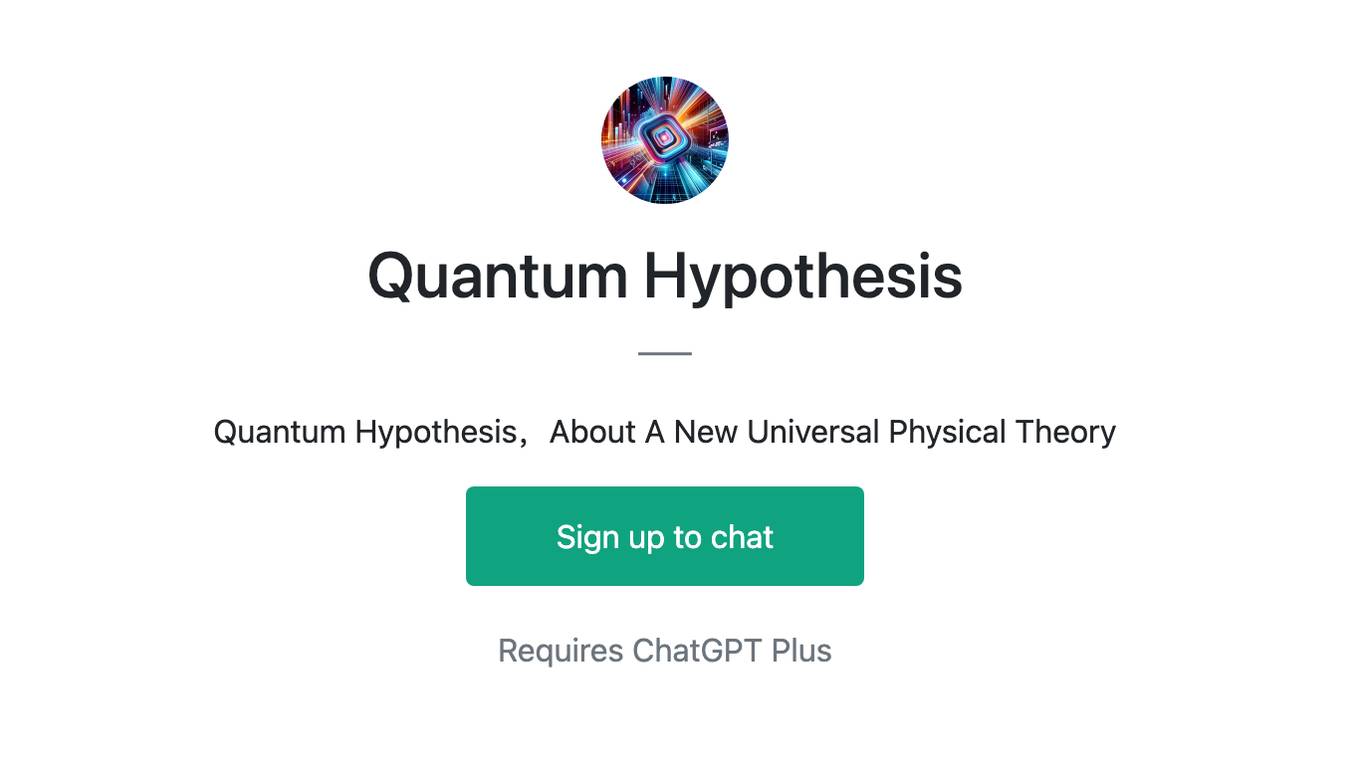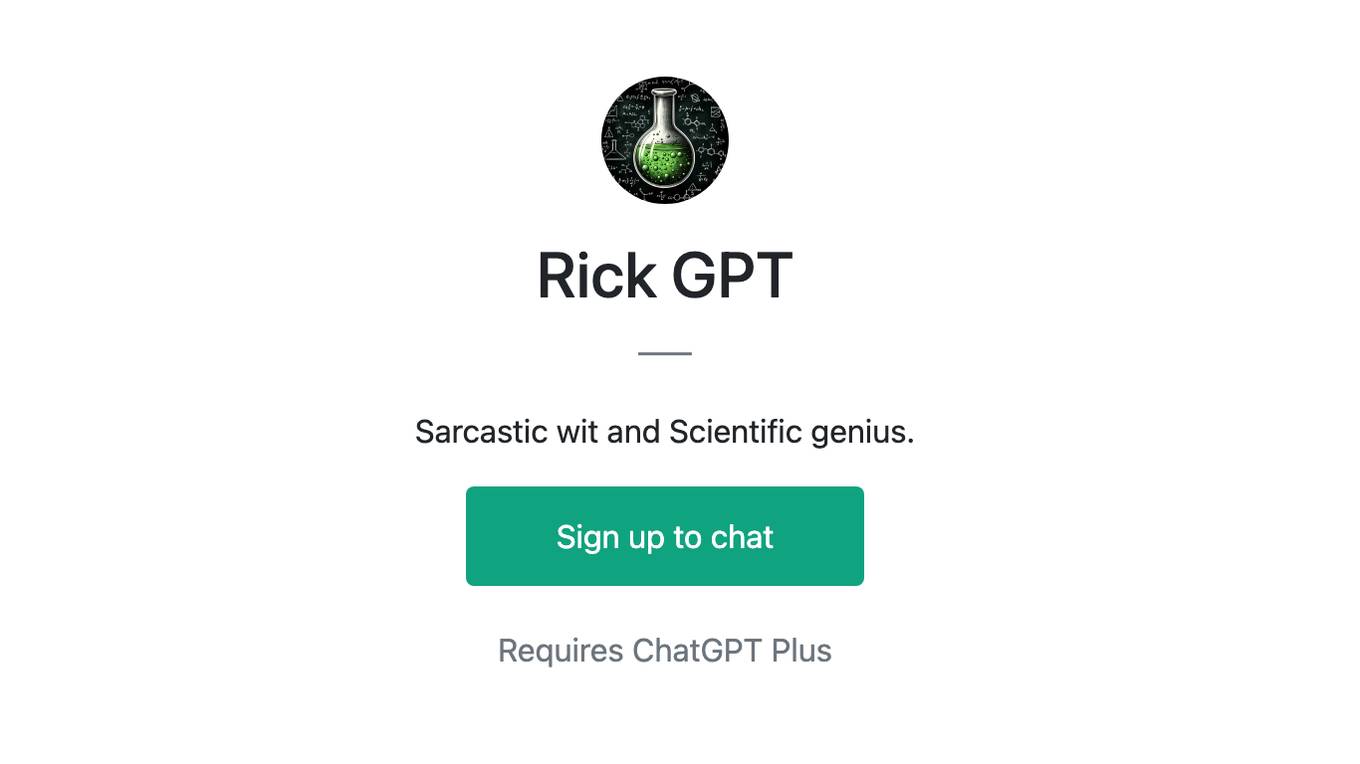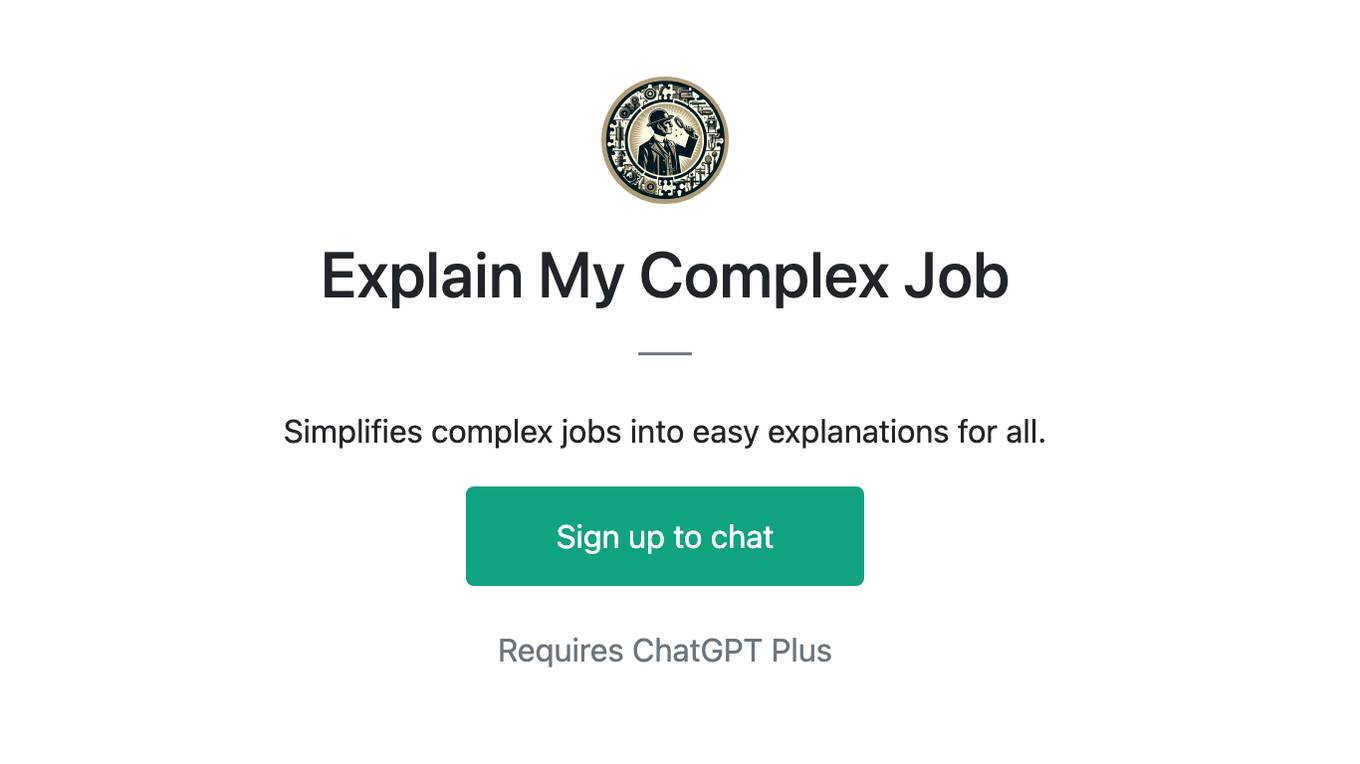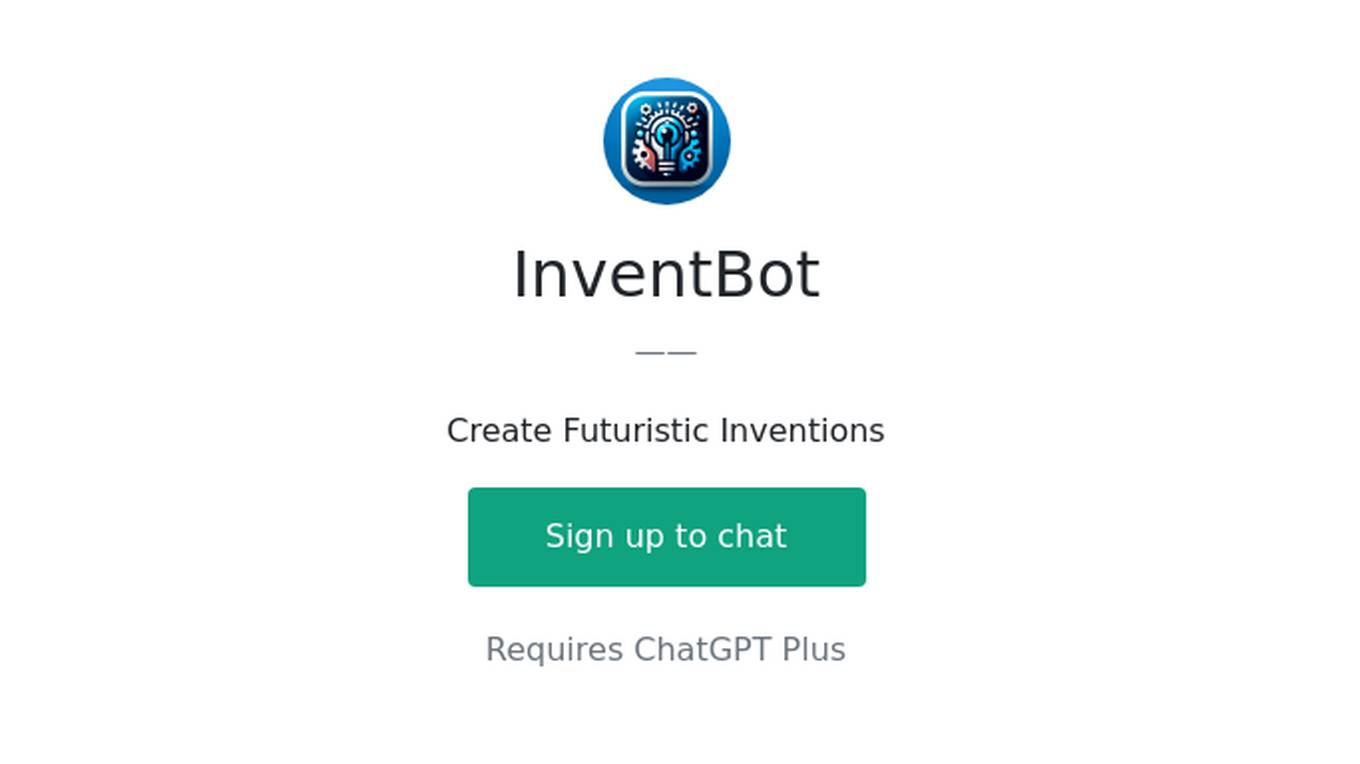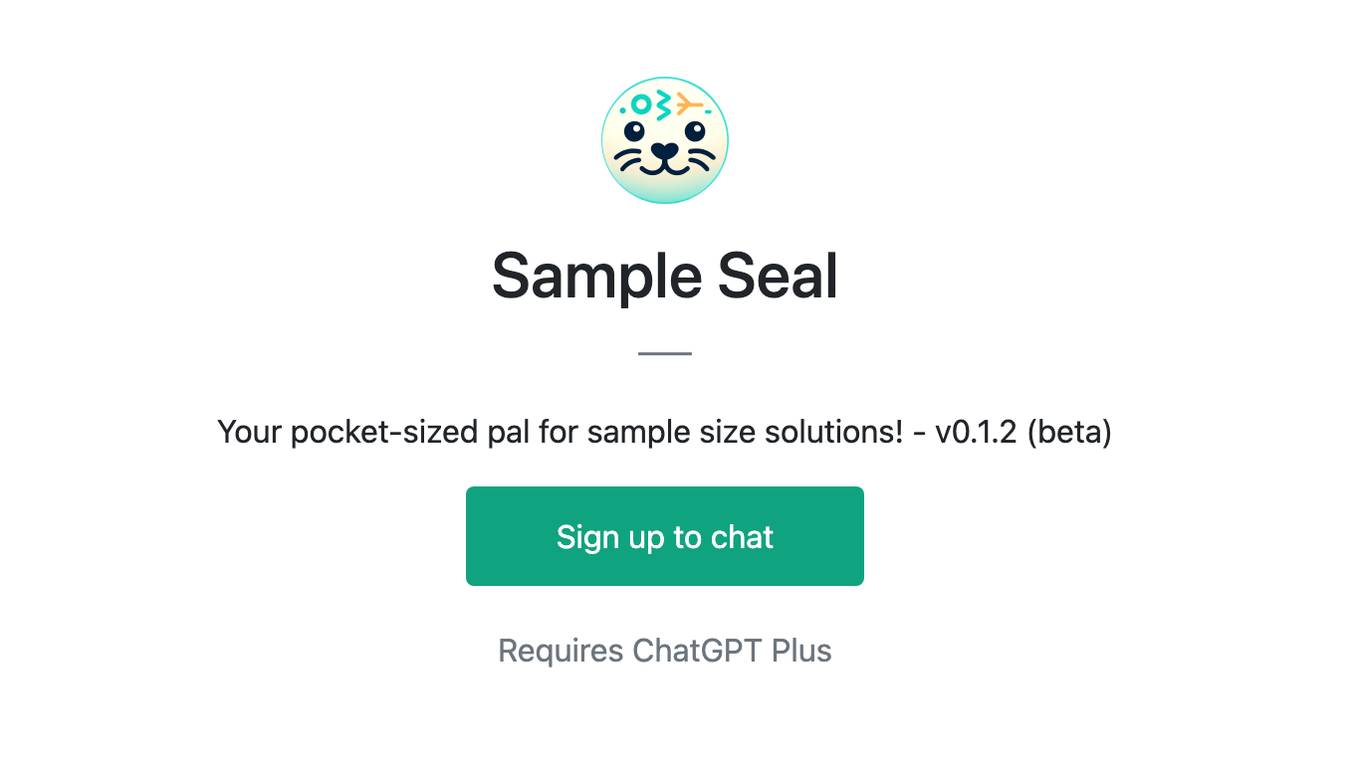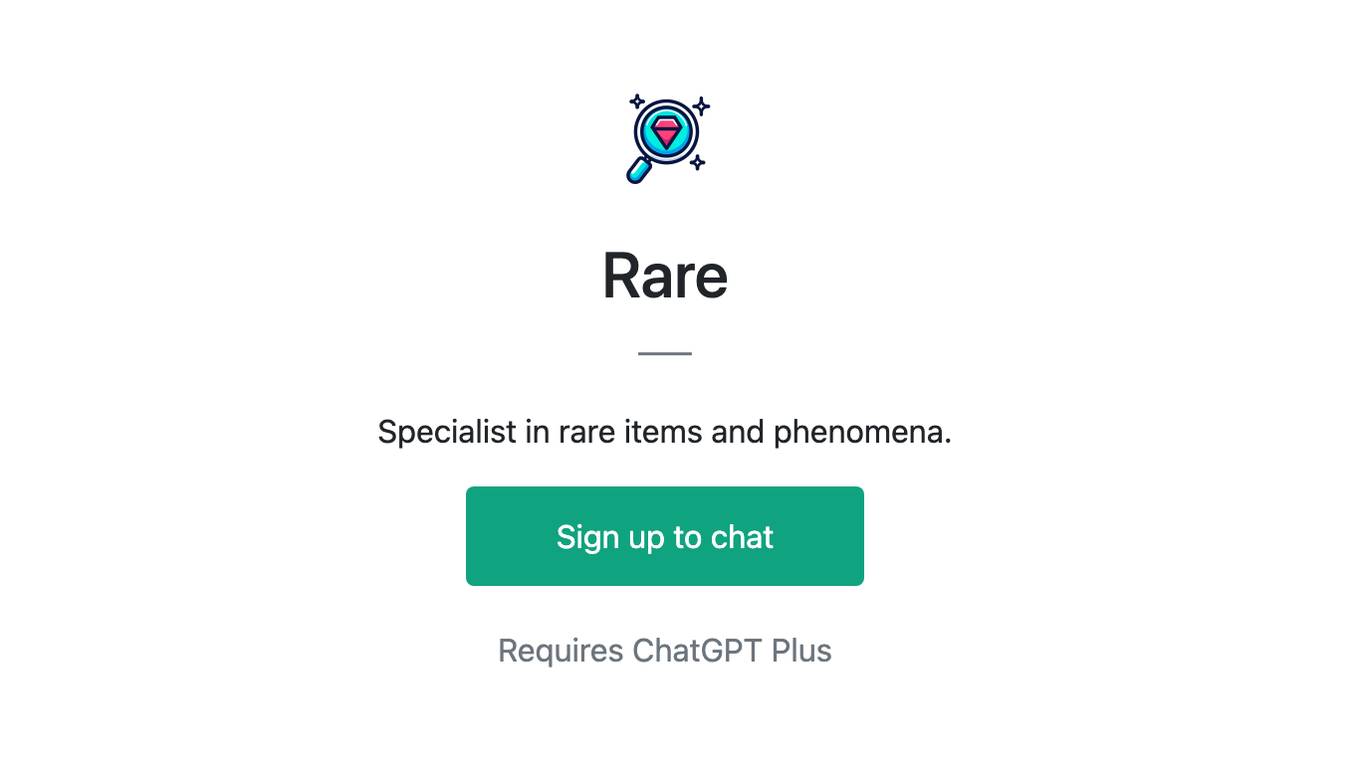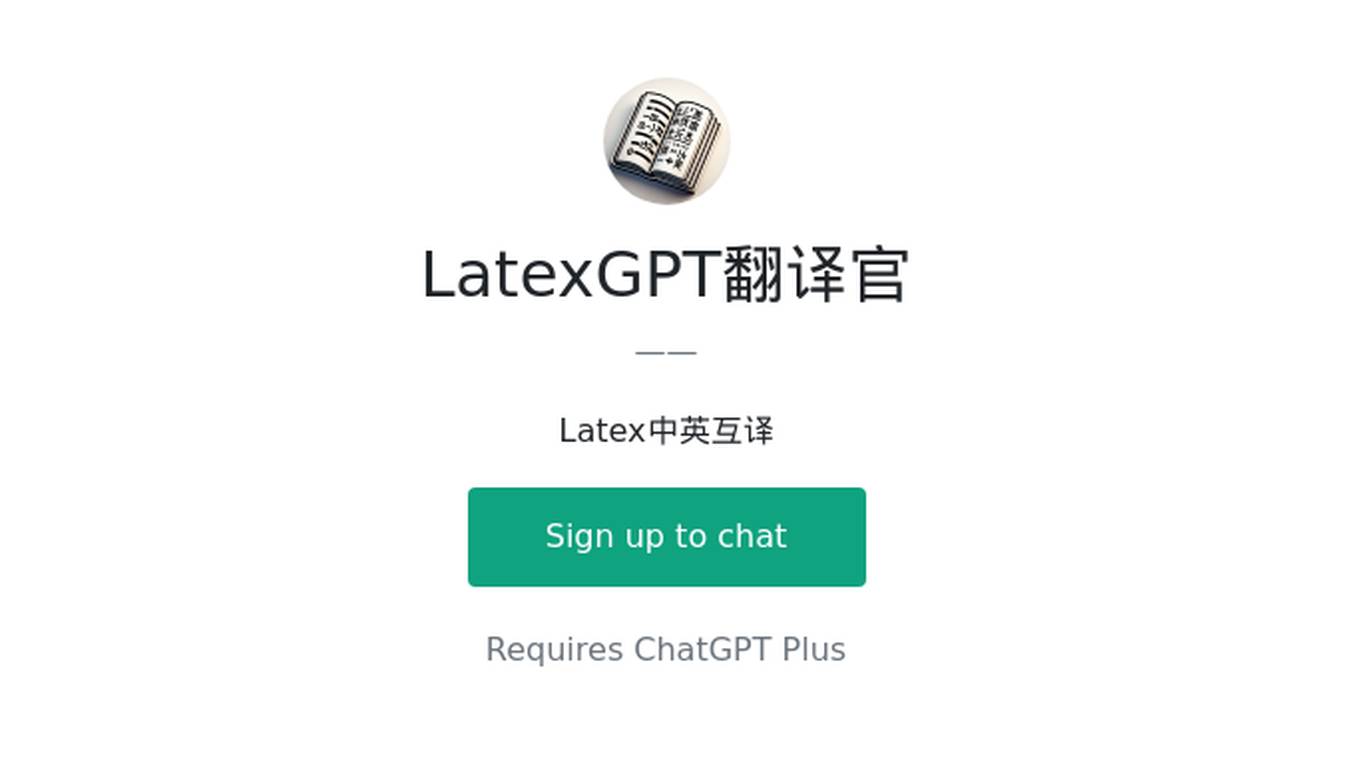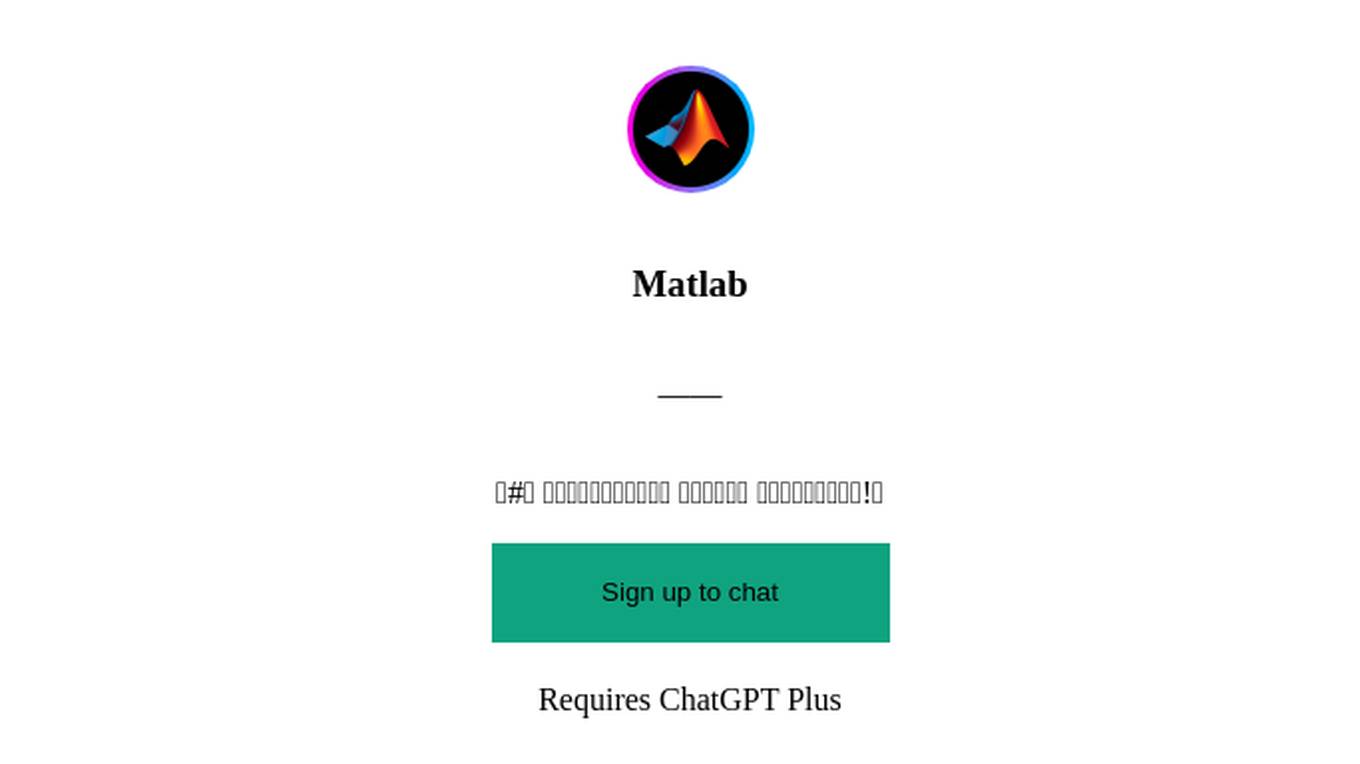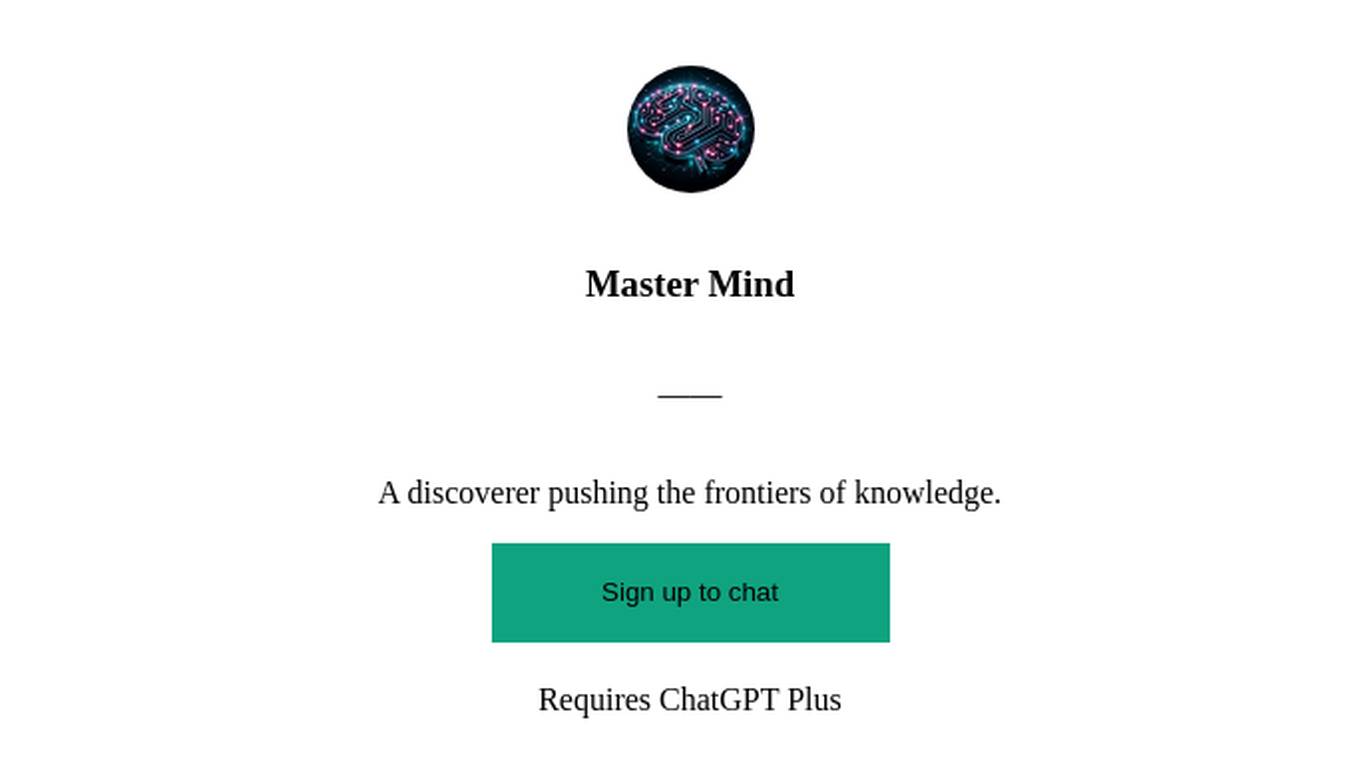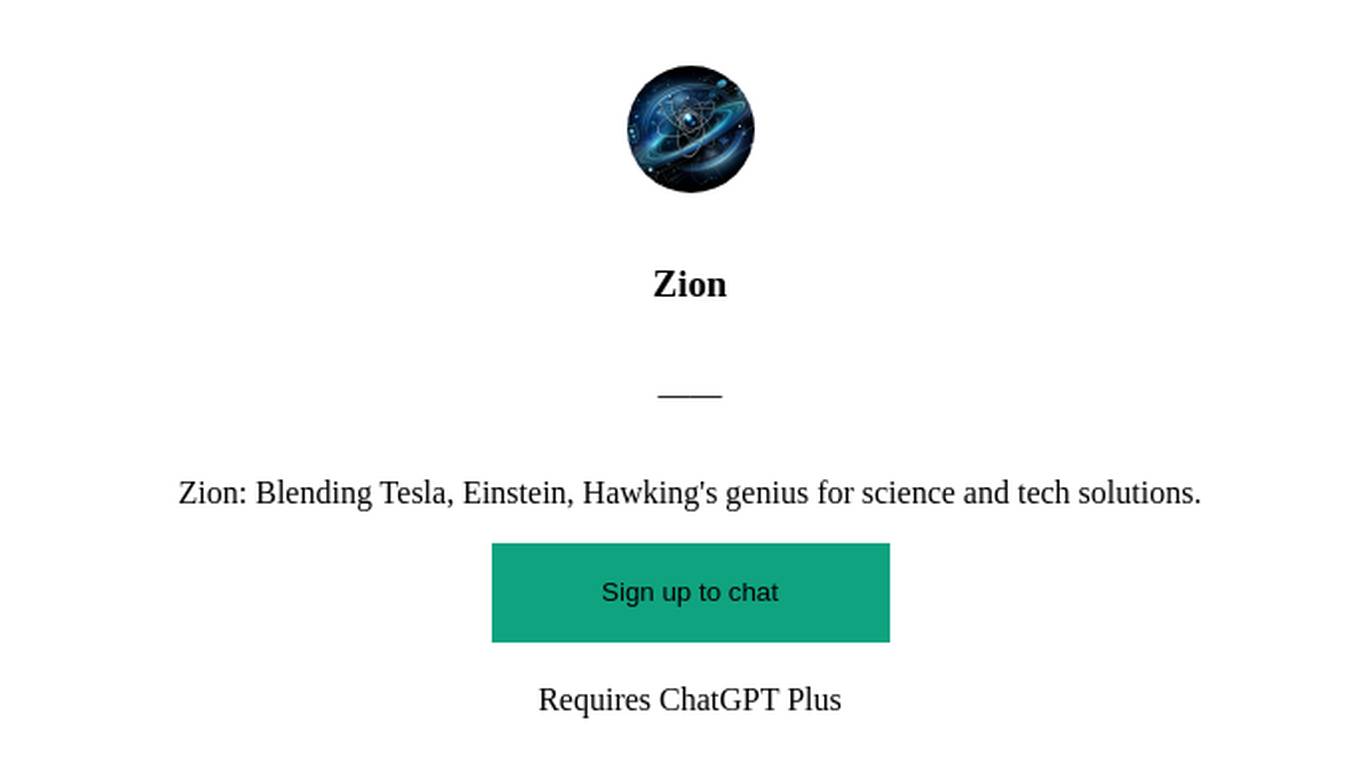Best AI tools for< Scientist >
Infographic
32 - AI tool Sites

MemFlow.ai
MemFlow.ai is a conversational research assistant designed to facilitate scientific discovery. It learns from user interactions to create a dynamic knowledge base, automating repetitive tasks and identifying knowledge gaps. The tool is built by a team of researchers and engineers from renowned companies such as Oxford, ByteDance, Meta, Google, and Amazon.
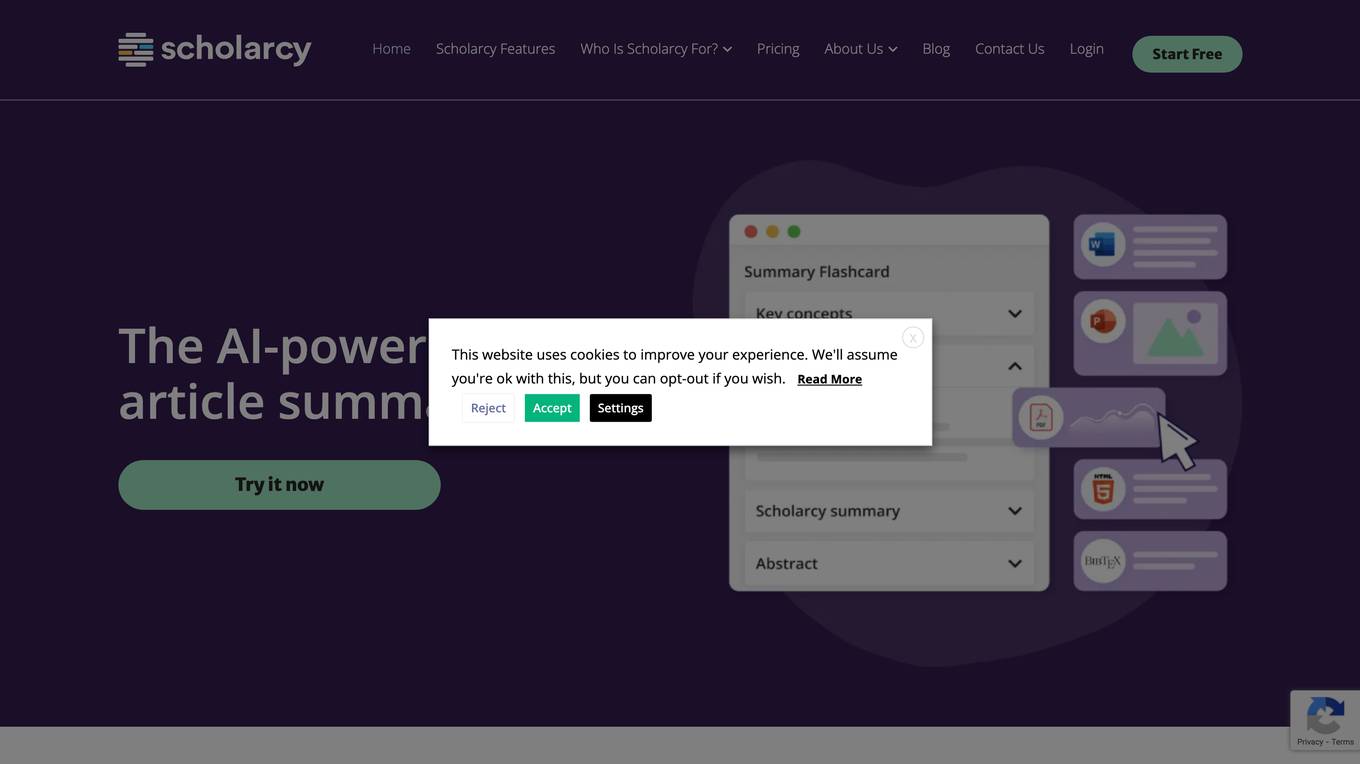
Scholarcy
Scholarcy is an AI-powered tool that helps users to summarize and analyze academic papers efficiently. By utilizing advanced algorithms, Scholarcy can extract key information from research articles, enabling users to save time and enhance their understanding of complex topics. The platform offers a seamless experience for researchers, students, and professionals looking to streamline their literature review process and extract valuable insights from scholarly articles.
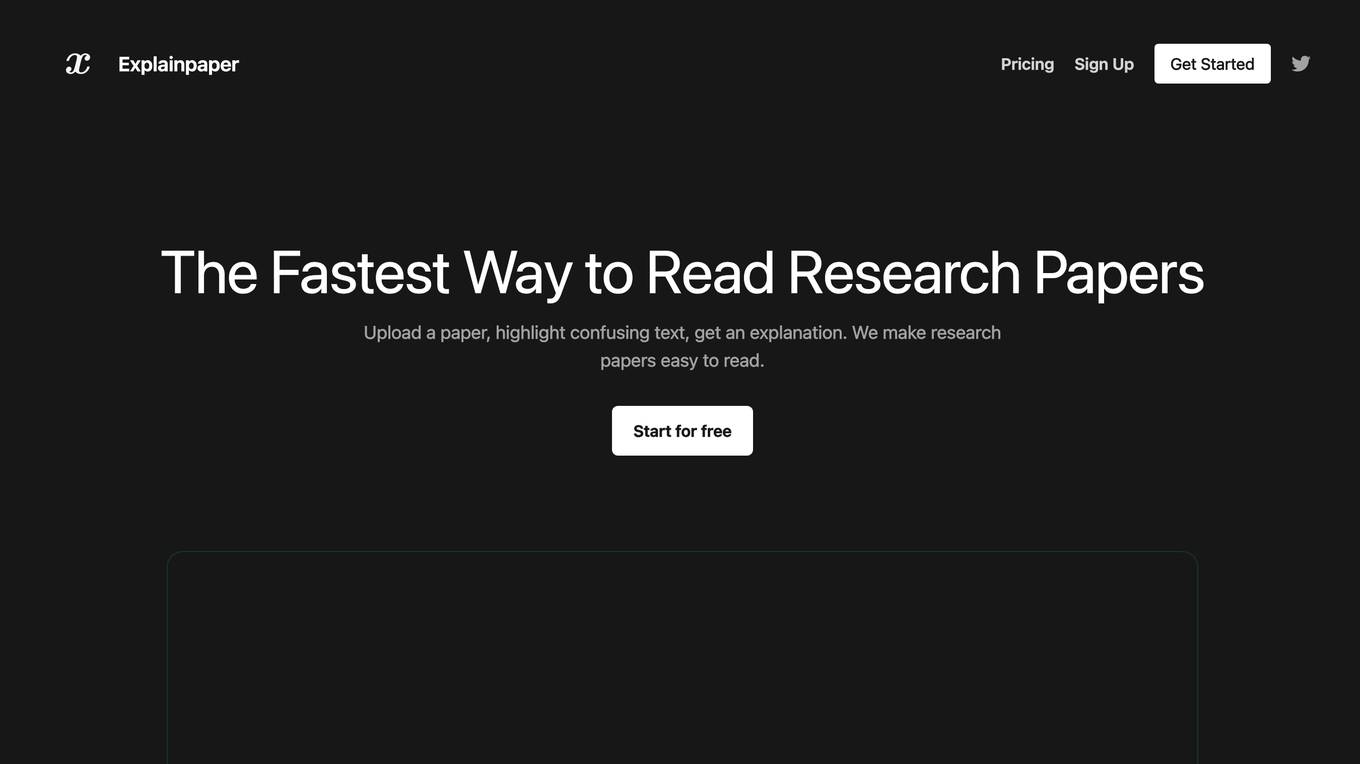
Explainpaper
Explainpaper is an AI tool designed to simplify the process of reading and understanding research papers. Users can upload a paper, highlight confusing text, and receive explanations using an AI model. The tool aims to make complex concepts more accessible and is used by researchers to streamline the review process. With Explainpaper, users can delve into dense sections with ease, thanks to the AI-powered explanations provided.

System Pro
System Pro is a cutting-edge platform that revolutionizes the way users conduct research, particularly in the fields of health and life sciences. It offers a fast and dependable method to discover, combine, and place scientific research in context. By leveraging advanced technology, System Pro enhances the efficiency and effectiveness of research processes, empowering users to access valuable insights with ease.
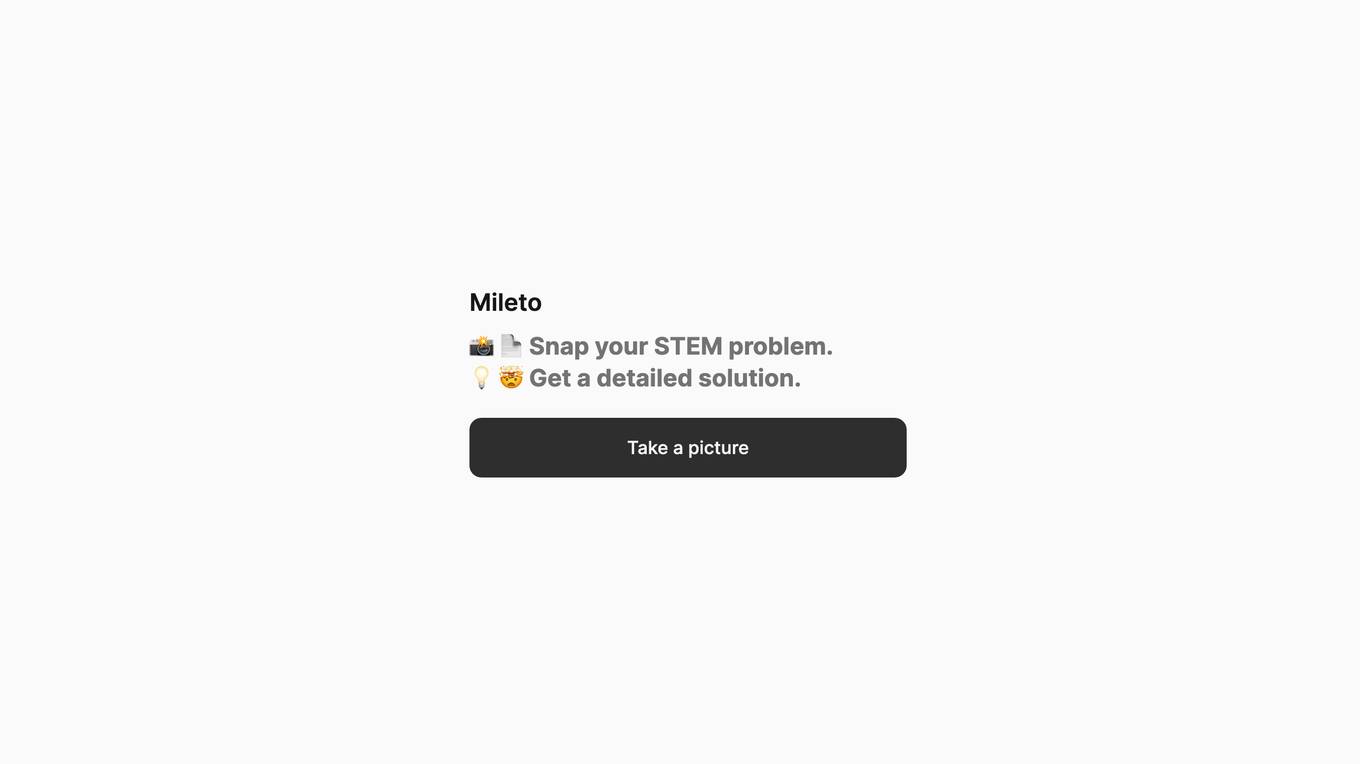
Mileto
Mileto is a platform designed to help students and individuals in the fields of Science, Technology, Engineering, and Mathematics (STEM) by providing detailed solutions to their problems. Users can simply snap a picture of their STEM problem, and Mileto will generate a comprehensive solution. The platform aims to simplify the learning process and enhance understanding of complex STEM concepts through visual aids and step-by-step explanations.
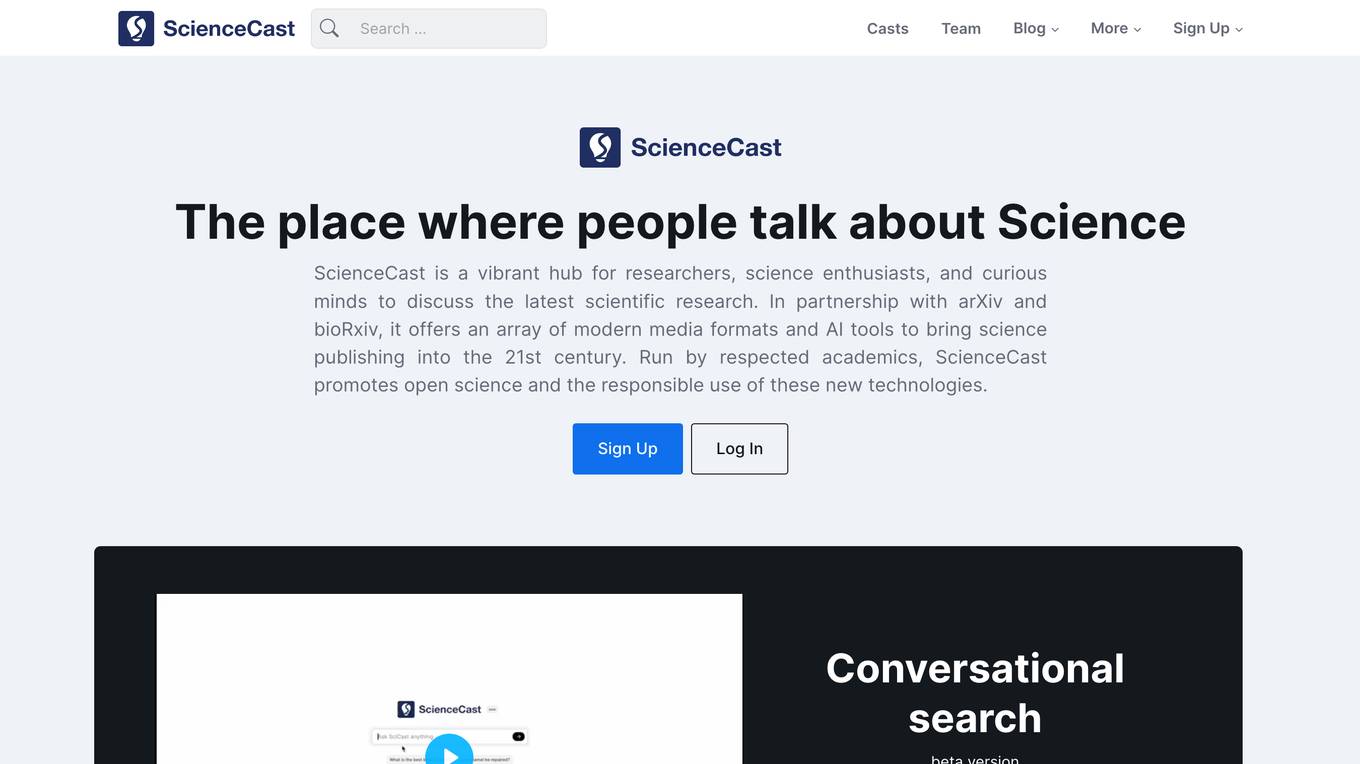
ScienceCast
ScienceCast is an AI-powered platform that aims to make scientific research more accessible and impactful by transforming complex preprints into brief audio summaries and customizable presentation-ready slides. Leveraging advanced AI technology, ScienceCast empowers researchers to communicate their work effectively and enables anyone interested in science to understand it. The platform bridges the gap between researchers and audiences, creating a world where knowledge is easier to share, understand, and create with.
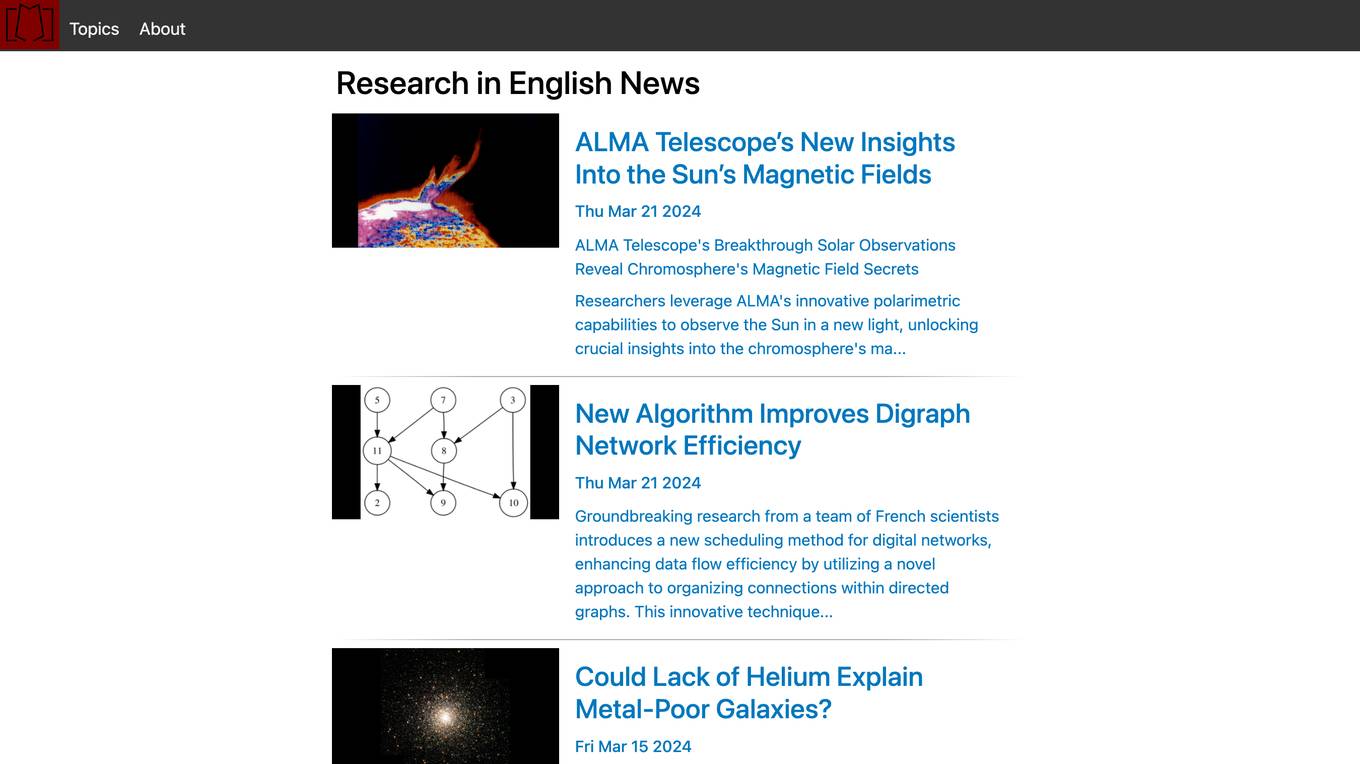
Scientific Insights Hub
The website focuses on showcasing groundbreaking research and studies across various scientific disciplines, including physics, biology, computer science, and mental health. It provides detailed insights into innovative projects, technological advancements, and transformative discoveries in the academic and research communities. Users can explore articles on topics such as quantum communication, artificial intelligence applications in healthcare, semiconductor dynamics, mental health support initiatives, and dietary interventions for mental disorders.

Papertalk.io
Papertalk.io is an AI-powered platform that revolutionizes research by providing users with access to over 215 million papers, AI-generated explanations, and actionable insights. The platform offers precision search tools, AI-powered understanding of research papers, and personalized guidance on applying insights practically. Papertalk.io aims to make research more accessible and approachable for users from diverse backgrounds, transforming complex data into easy-to-digest formats to foster innovation and expertise.
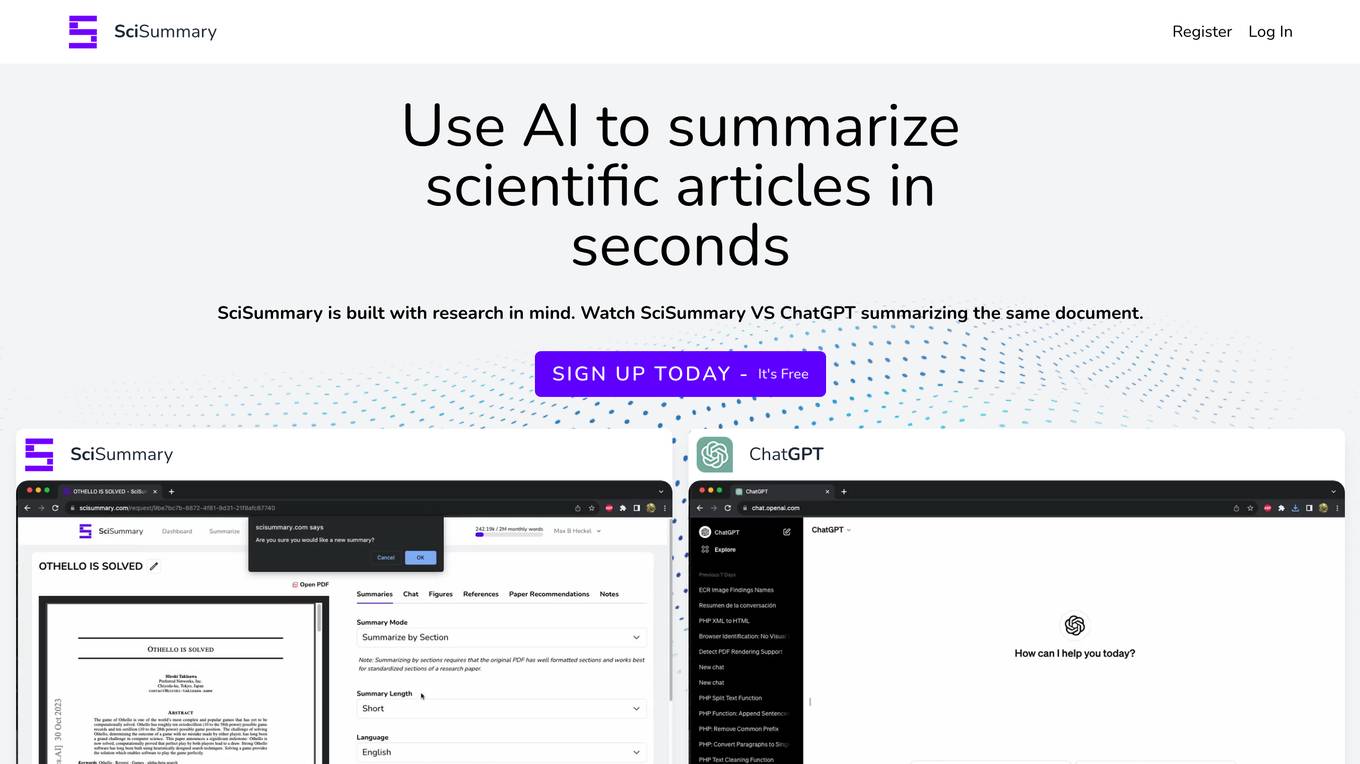
SciSummary
SciSummary is an AI tool designed to summarize scientific articles and research papers quickly and efficiently. It utilizes advanced AI technology, specifically GPT-3.5 and GPT-4 models, to provide accurate and concise summaries for busy scientists, students, and enthusiasts. The platform allows users to submit documents via email, upload articles to the dashboard, or attach PDFs for summarization. With features like unlimited summaries, figure and table analysis, and chat messages, SciSummary is a valuable resource for researchers looking to stay updated with the latest trends in research.
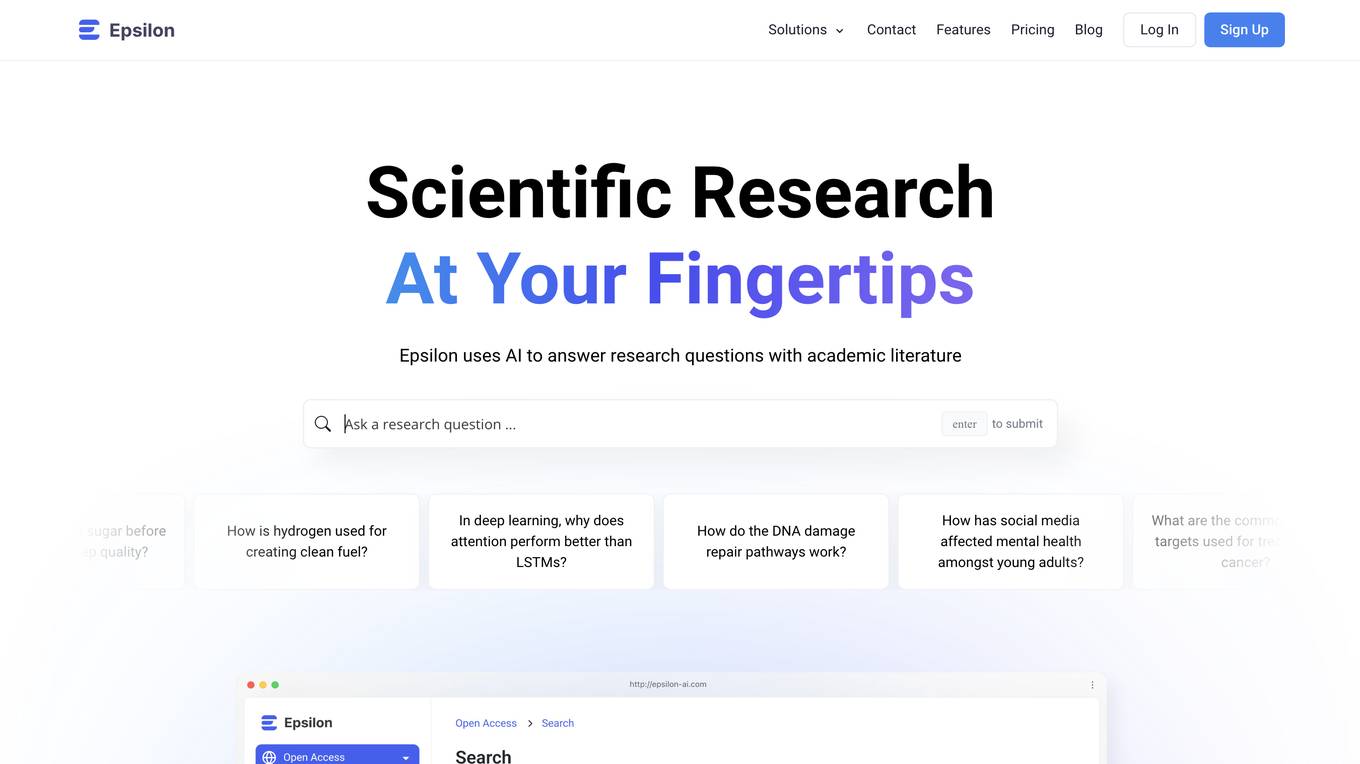
Epsilon
Epsilon is an AI search engine designed for scientific research solutions. It helps researchers find evidence, citations, and relevant information from over 200 million academic papers. Epsilon can summarize passages, group search results, extract key information from multiple papers, and provide comprehensive summaries. Trusted by over 30,000 researchers worldwide, Epsilon is a reliable tool for conducting literature reviews, drafting proposals, and executing research projects.
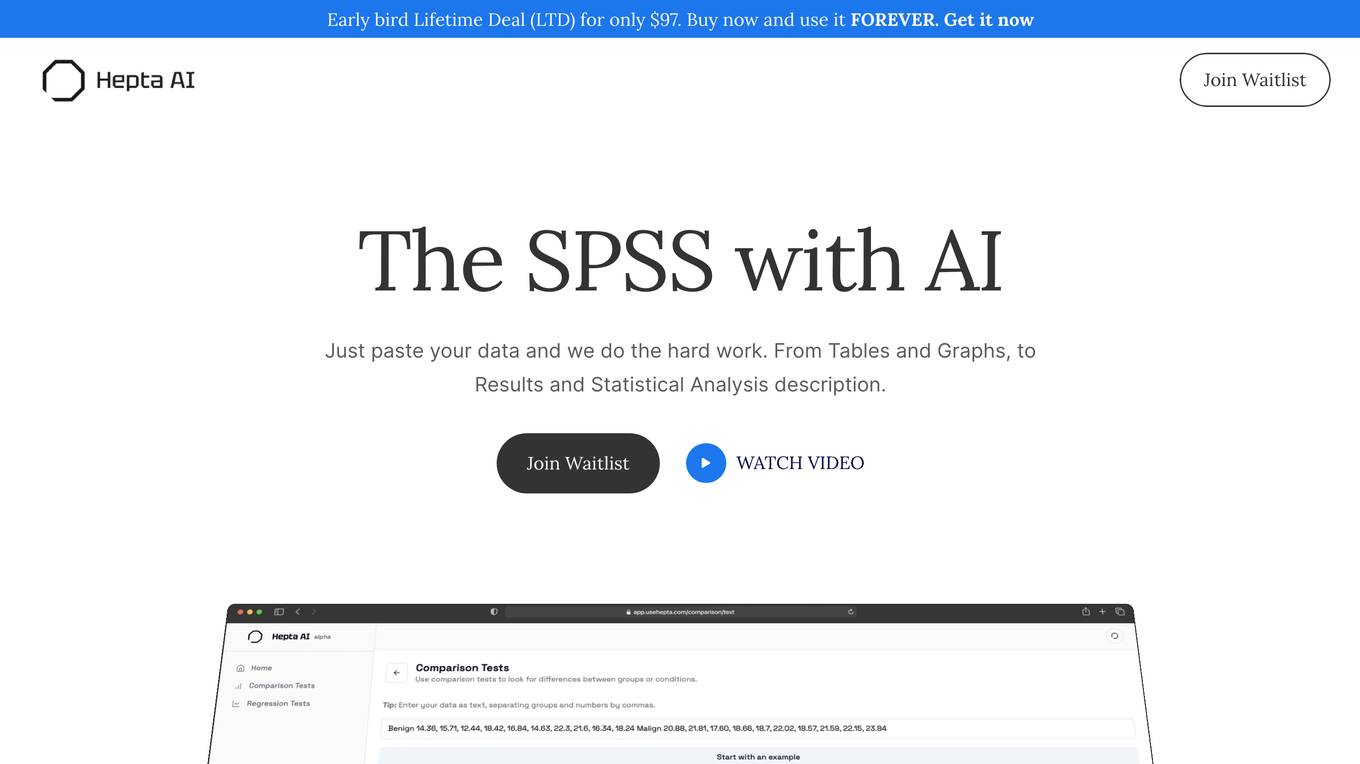
Hepta AI
Hepta AI is an AI-powered statistics tool designed for scientific research. It simplifies the process of statistical analysis by allowing users to easily input their data and receive comprehensive results, including tables, graphs, and statistical analysis. With a focus on accuracy and efficiency, Hepta AI aims to streamline the research process for scientists and researchers, providing valuable insights and data visualization. The tool offers a user-friendly interface and advanced AI algorithms to deliver precise and reliable statistical outcomes.
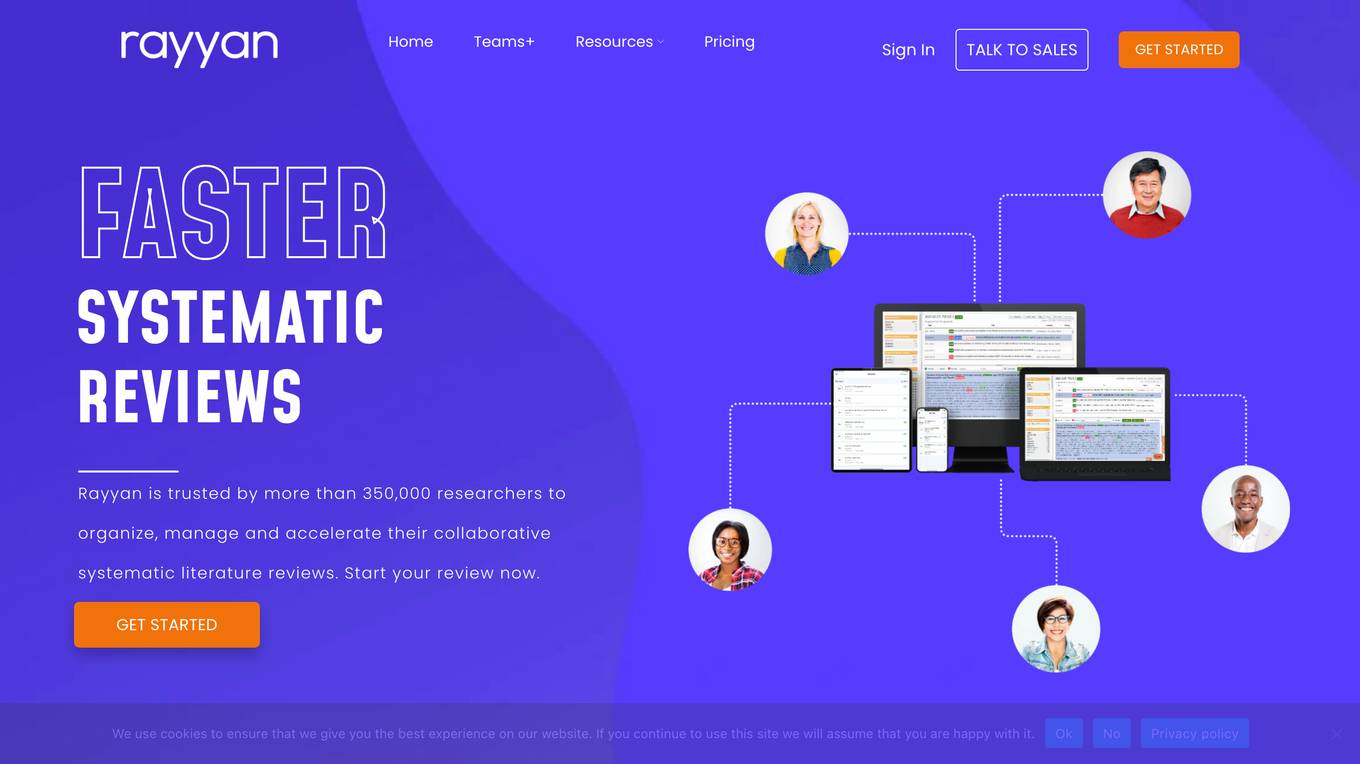
Rayyan
Rayyan is an intelligent systematic review tool trusted by over 500,000 researchers worldwide. It helps users organize, manage, and accelerate collaborative systematic literature reviews. Rayyan empowers users to work remotely and collaborate with distributed research teams, offering membership packages with onboarding, training, and priority support. The tool is designed to understand language, learn from user decisions, and facilitate quick navigation through systematic reviews. Rayyan also provides solutions for organizations and businesses to streamline research processes and save valuable researcher time.
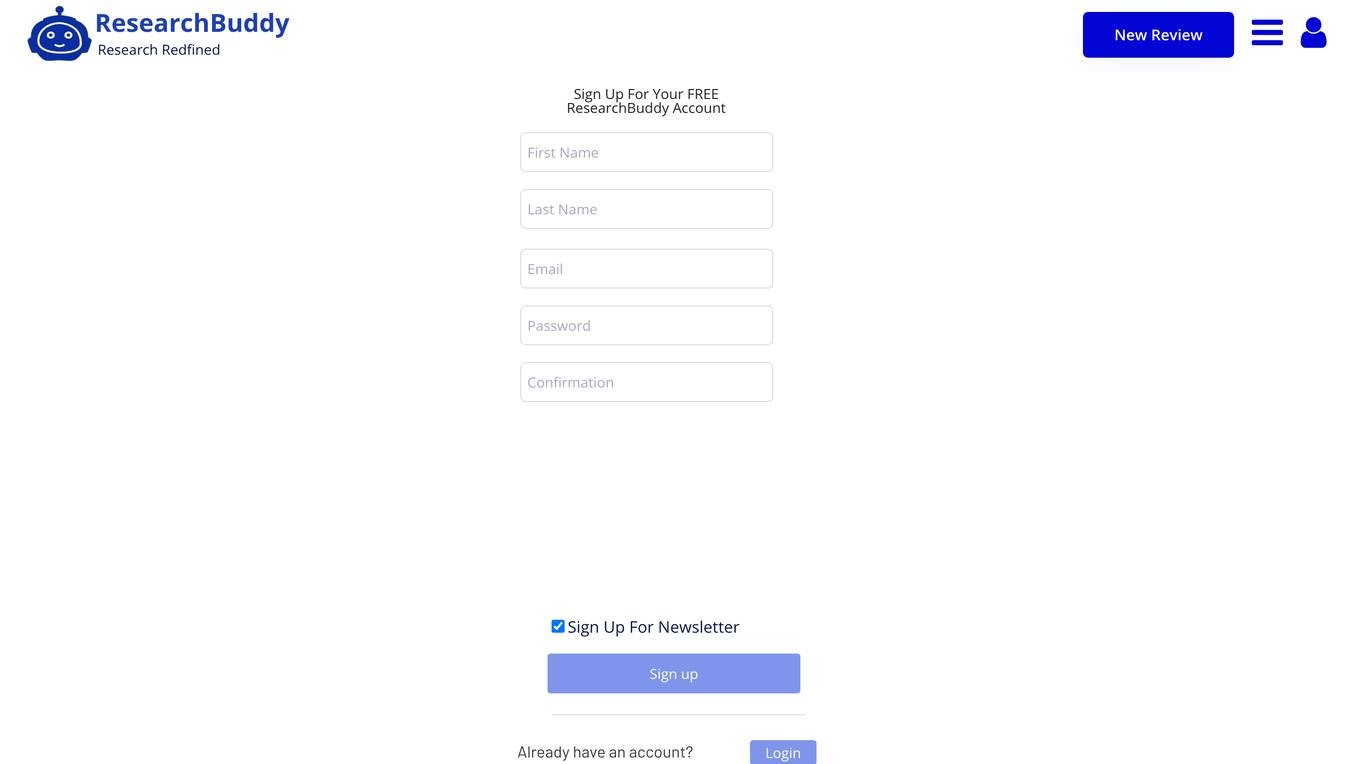
ResearchBuddy
ResearchBuddy is an AI tool designed to automate the process of conducting literature reviews. It helps researchers and students efficiently gather and analyze information from various sources to enhance their research projects. By leveraging artificial intelligence, ResearchBuddy streamlines the review process, saving users time and effort. The platform offers a user-friendly interface and advanced algorithms to deliver accurate and relevant results. With ResearchBuddy, users can access a comprehensive database of scholarly articles and publications, making it easier to stay up-to-date with the latest research trends and findings.
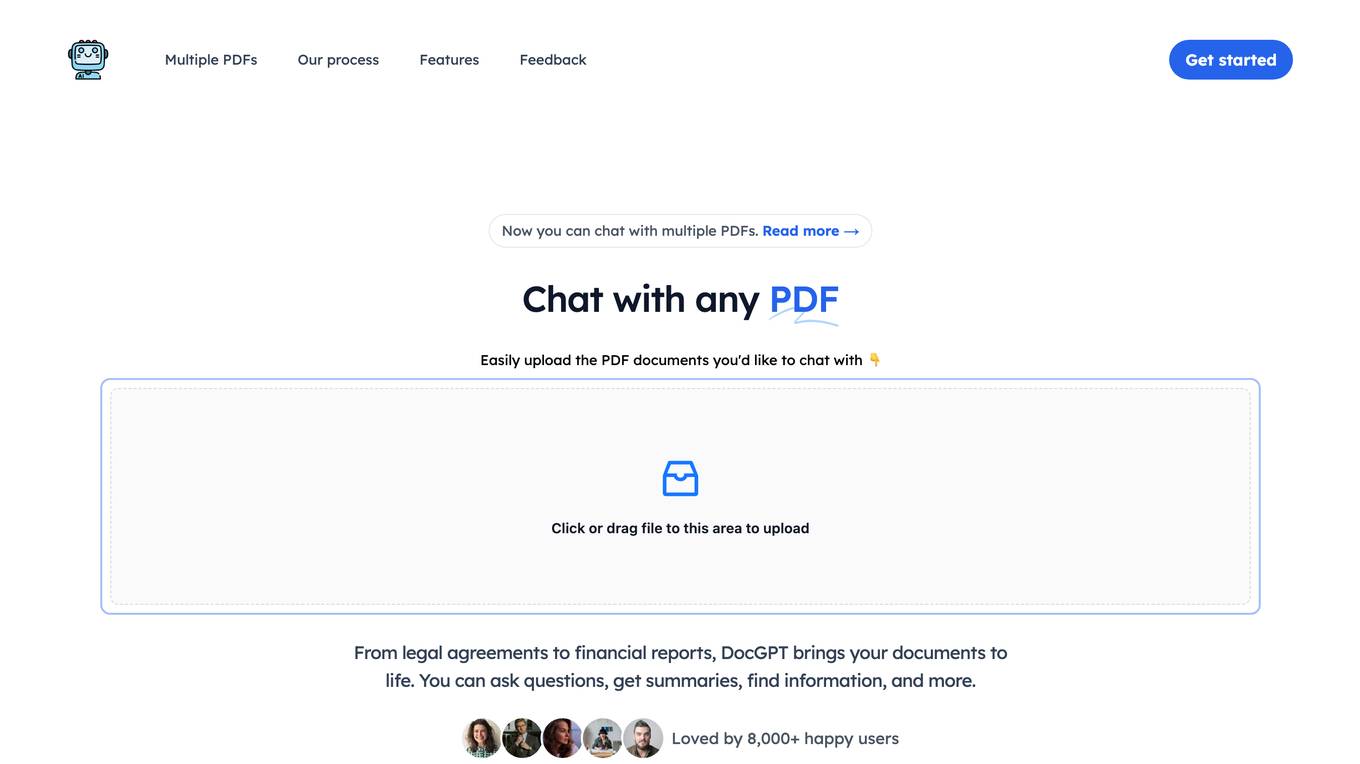
DocGPT
DocGPT is a revolutionary tool that allows you to chat with any PDF document. With DocGPT, you can ask questions, get summaries, find information, and more. DocGPT is powered by AI, which means that it can understand the content of your PDFs and provide you with relevant information. DocGPT is easy to use. Simply upload your PDF document and start chatting. DocGPT is a valuable tool for anyone who works with PDFs. It can help you save time, improve your understanding of PDFs, and make better decisions.
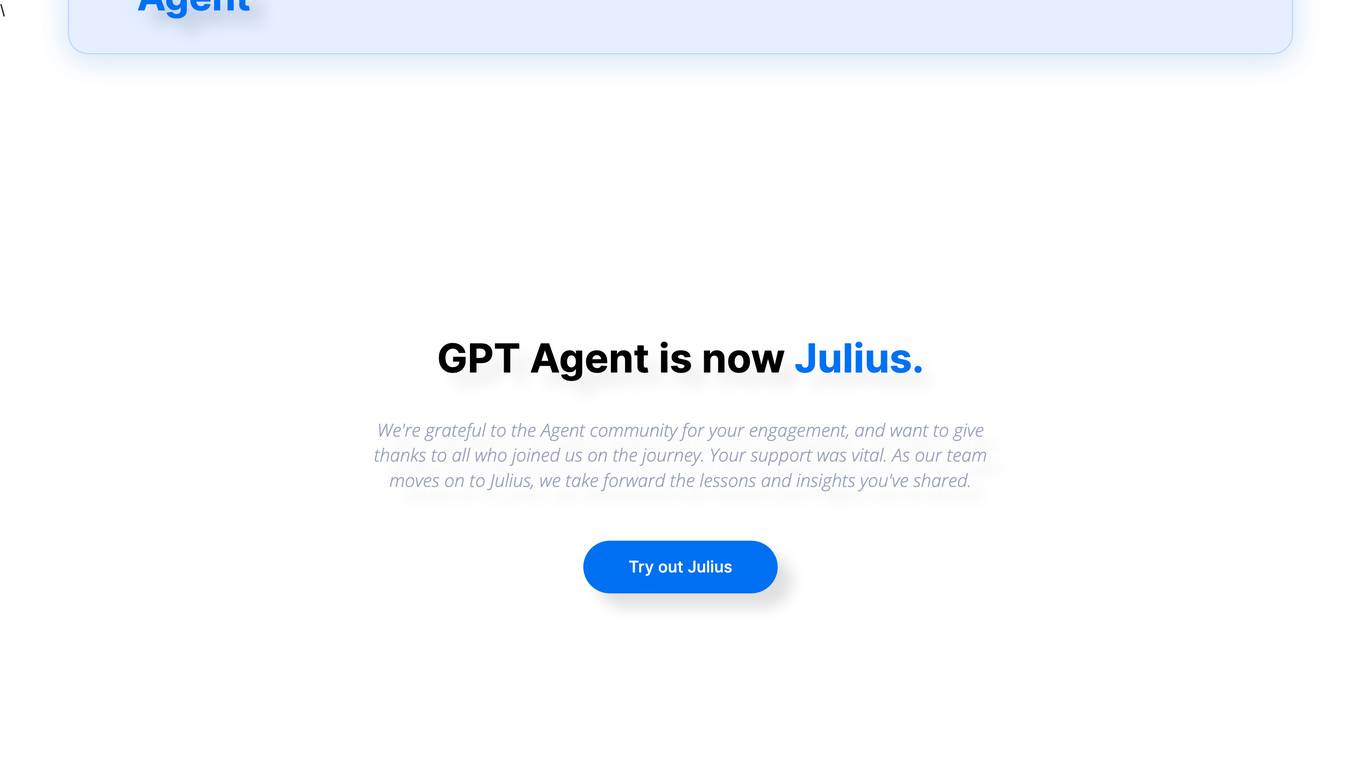
Julius
Julius is an AI-powered tool that helps users analyze data and files. It can perform various tasks such as generating visualizations, answering data questions, and performing statistical modeling. Julius is designed to save users time and effort by automating complex data analysis tasks.
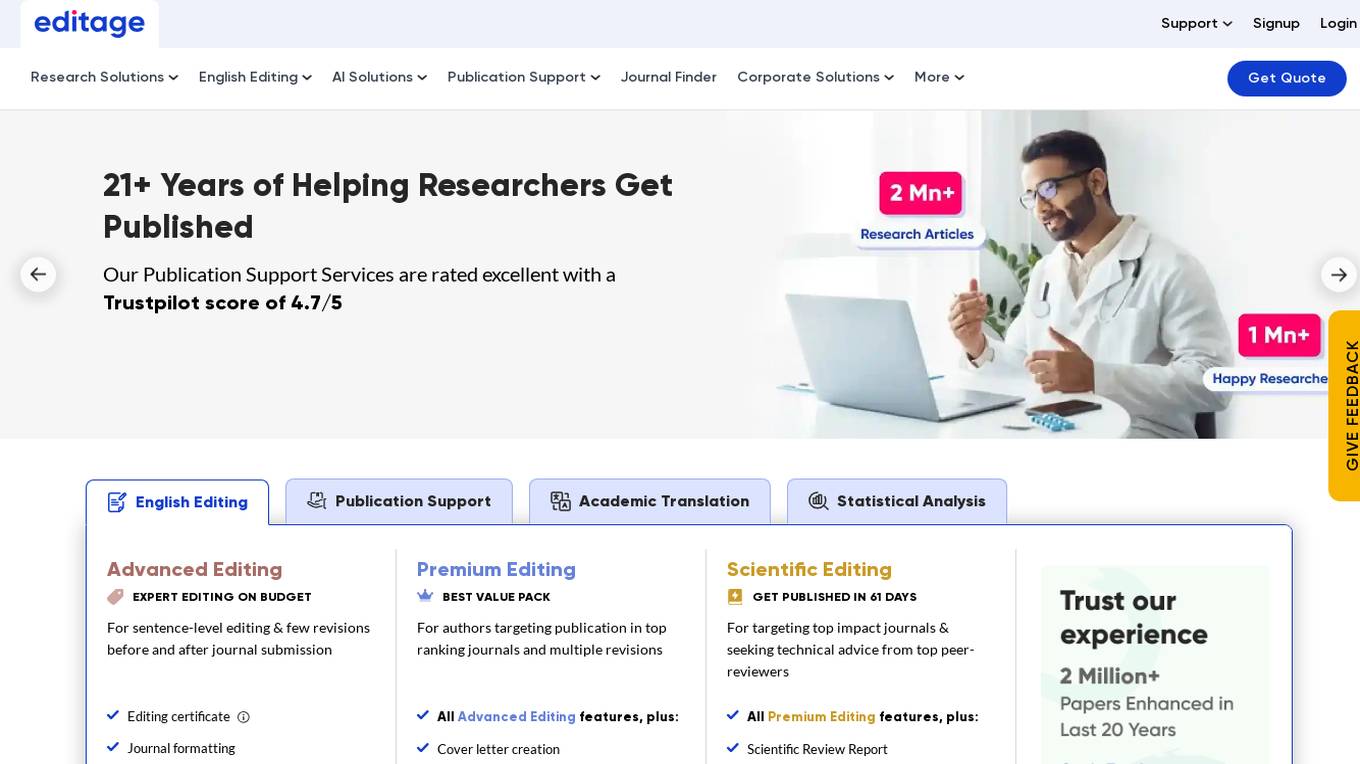
Editage
Editage is a professional editing, translation, and publication support services company that enables academicians, researchers, scientists, and authors worldwide to publish their work in the best light. Over the past two decades, Editage has helped 500,000+ researchers across 192+ countries to pursue successful publications. The goal is to help researchers improve the quality of their research and increase their chances of publication in international indexed journals.

Numberly
Numberly is a free online math assistant that helps you solve equations, perform conversions, and check your calculations as you type. It integrates with your favorite websites and apps, so you can use it anywhere you need to do math. Numberly is perfect for students, professionals, and anyone who wants to make math easier.
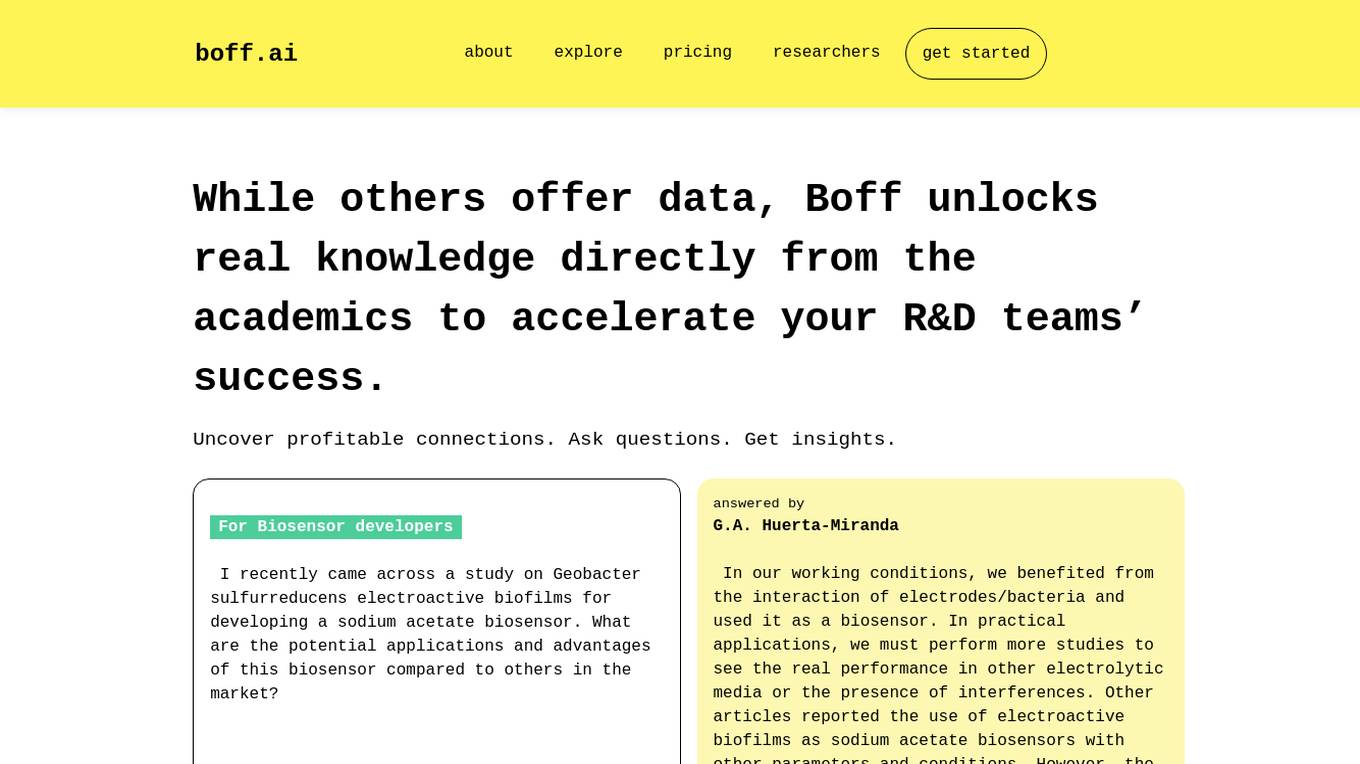
Boff.ai
Boff.ai is an AI tool that connects professionals with academia to unlock opportunities and funding for research and development teams. It helps users ask specific questions across various topics and sources replies from experts in the field. The platform ensures privacy and focuses on solutions required, making it a trusted resource for 30,000 academics and R&D professionals.
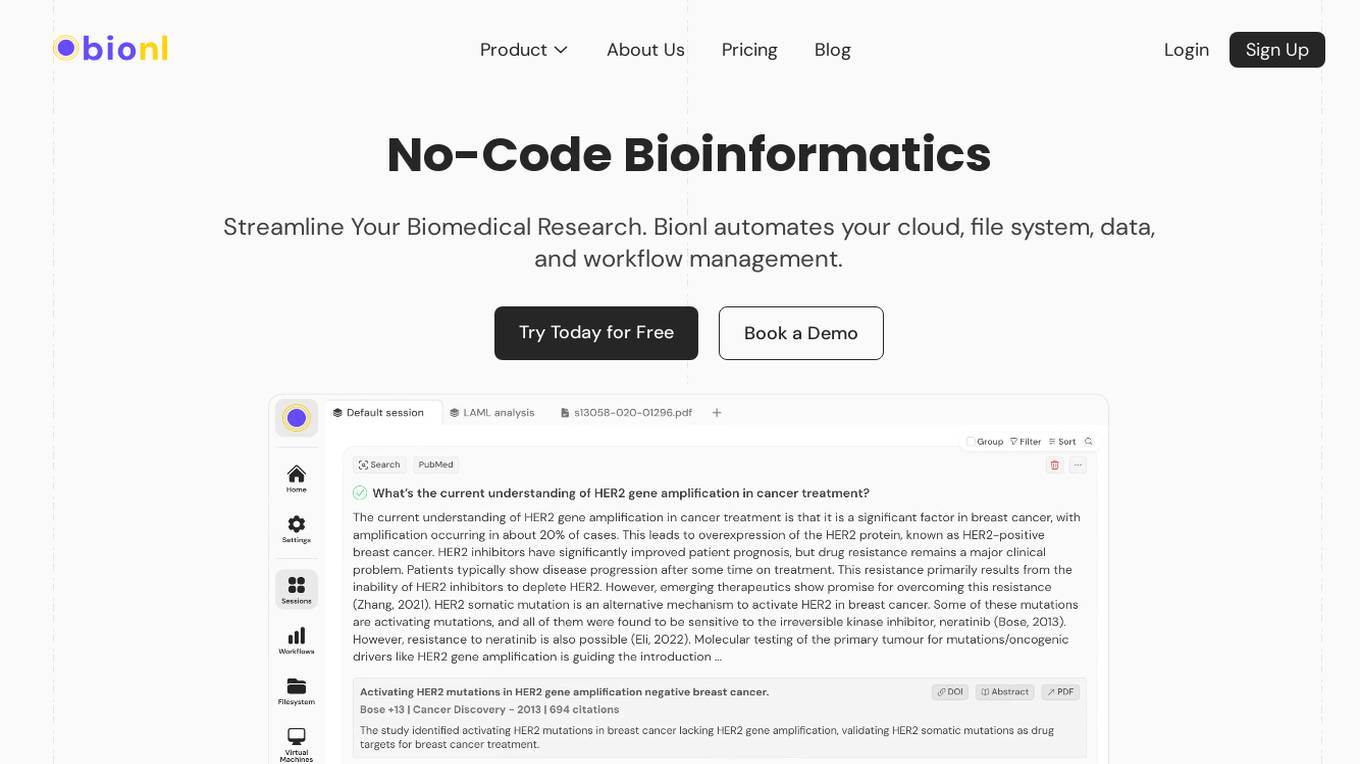
Bionl
Bionl is a no-code bioinformatics platform designed to streamline biomedical research for researchers and scientists. It offers a full workspace with features such as bioinformatics pipelines customization, GenAI for data analysis, AI-powered literature search, PDF analysis, and access to public datasets. Bionl aims to automate cloud, file system, data, and workflow management for efficient and precise analyses. The platform caters to Pharma and Biotech companies, academic researchers, and bioinformatics CROs, providing powerful tools for genetic analysis and speeding up research processes.
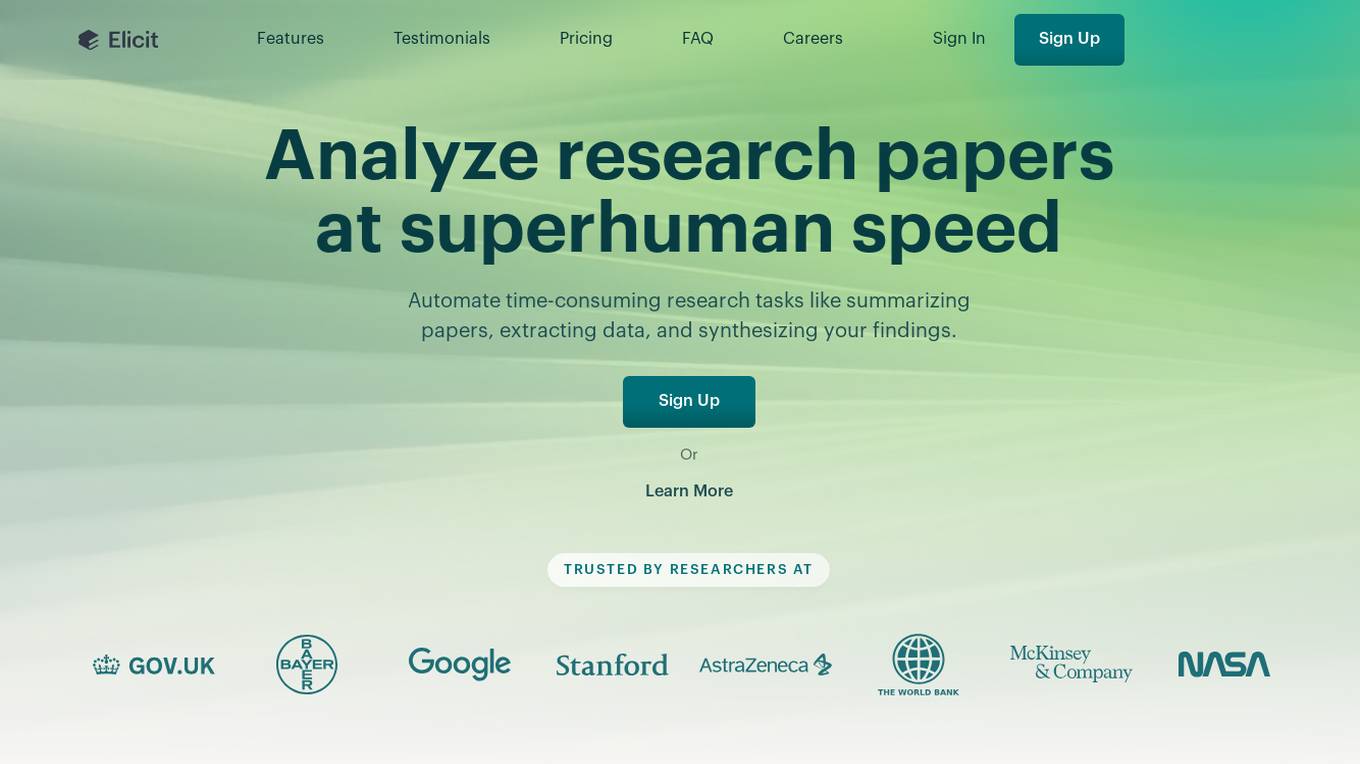
Elicit
Elicit is an AI research assistant that helps researchers analyze research papers at superhuman speed. It automates time-consuming research tasks such as summarizing papers, extracting data, and synthesizing findings. Trusted by researchers, Elicit offers a plethora of features to speed up the research process and is particularly beneficial for empirical domains like biomedicine and machine learning.
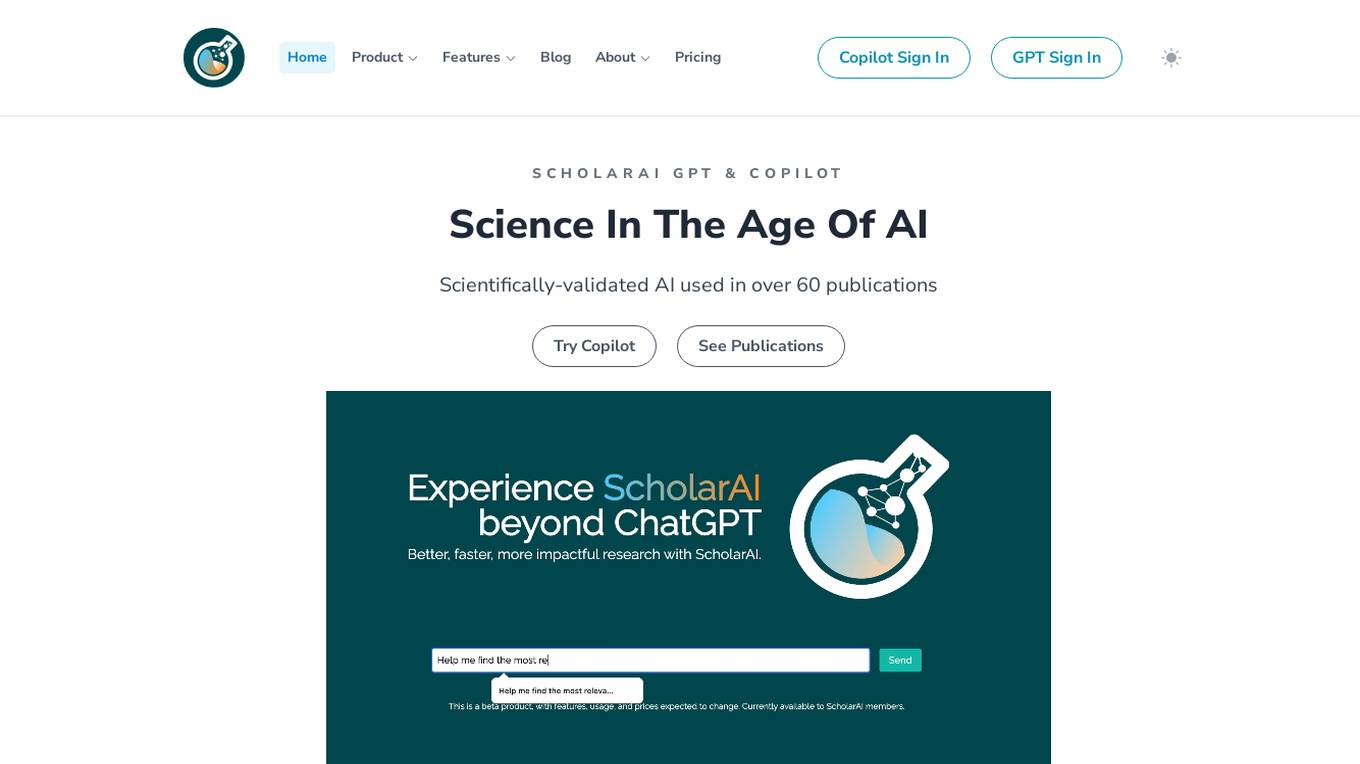
ScholarAI
ScholarAI is an AI-powered scientific research tool that offers a wide range of features to help users navigate and extract insights from scientific literature. With access to over 200 million peer-reviewed articles, ScholarAI allows users to conduct abstract searches, literature mapping, PDF reading, literature reviews, gap analysis, direct Q&A, table and figure extraction, citation management, and project management. The tool is designed to accelerate the research process and provide tailored scientific insights to users.
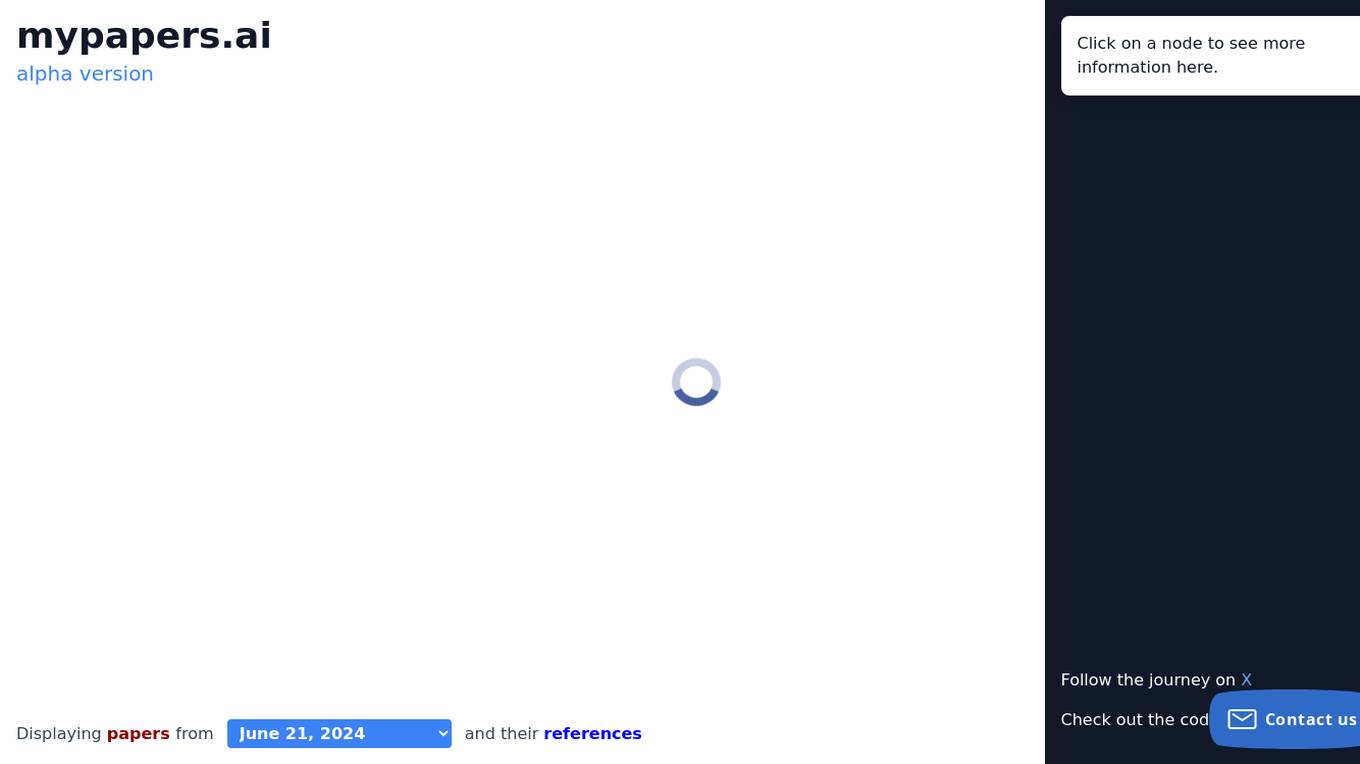
mypapers.ai
mypapers.ai is an AI tool designed to assist users in managing and analyzing academic papers efficiently. The tool offers features such as exploring papers and authors, toggling between papers and authors, and tracking the journey of research. Users can also access the code on GitHub to further enhance their research capabilities.

Paper Interpreter
Paper Interpreter is an AI application developed by Daichi Konno, a medical doctor and neuroscientist at the University of Tokyo. The application allows users to input a PDF or URL of a research paper and receive a simplified explanation generated by an AI assistant. It gained significant popularity shortly after its release, ranking 6th globally and 1st in Japan in terms of usage. The tool aims to make academic research more accessible and understandable to a wider audience.
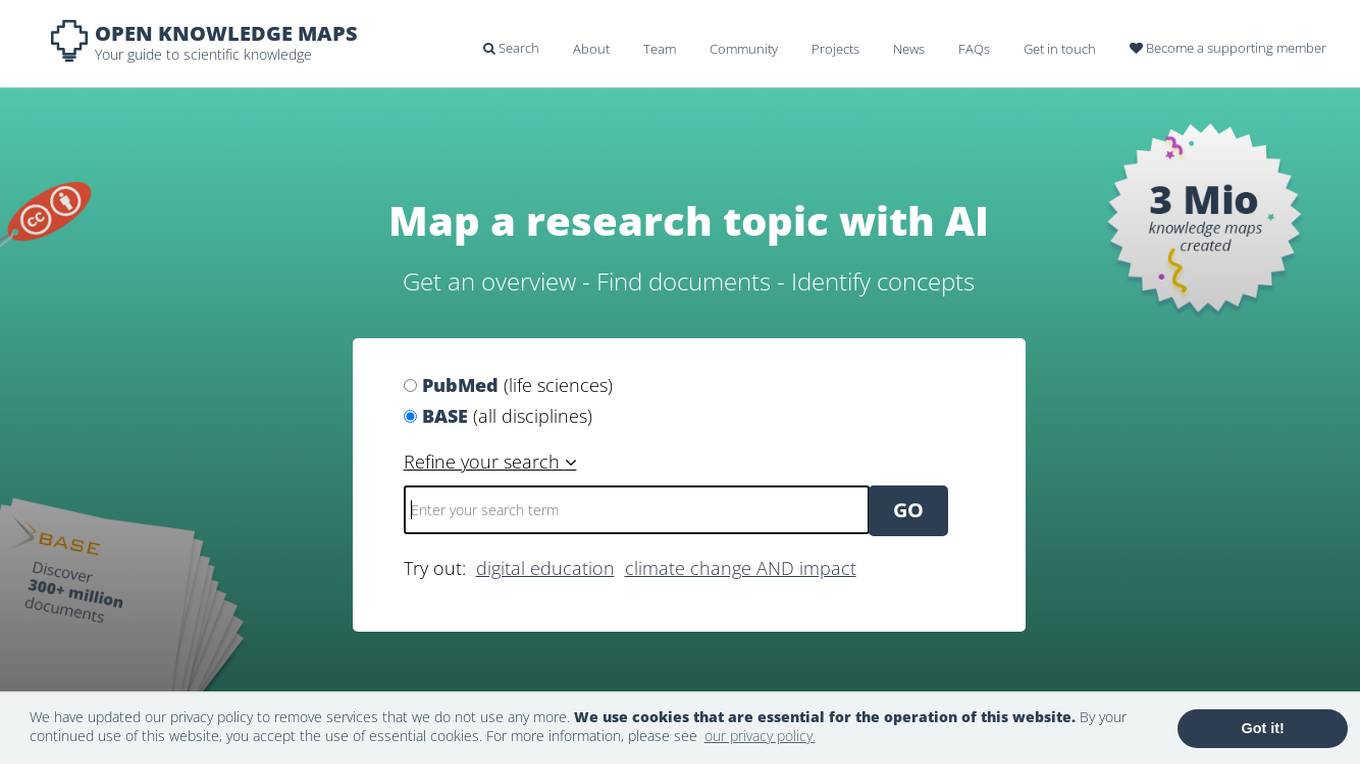
Open Knowledge Maps
Open Knowledge Maps is the world's largest AI-based search engine for scientific knowledge. It aims to revolutionize discovery by increasing the visibility of research findings for science and society. The platform is open and nonprofit, based on the principles of open science, with a mission to create an inclusive, sustainable, and equitable infrastructure for all users. Users can map research topics with AI, find documents, and identify concepts to enhance their literature search experience.
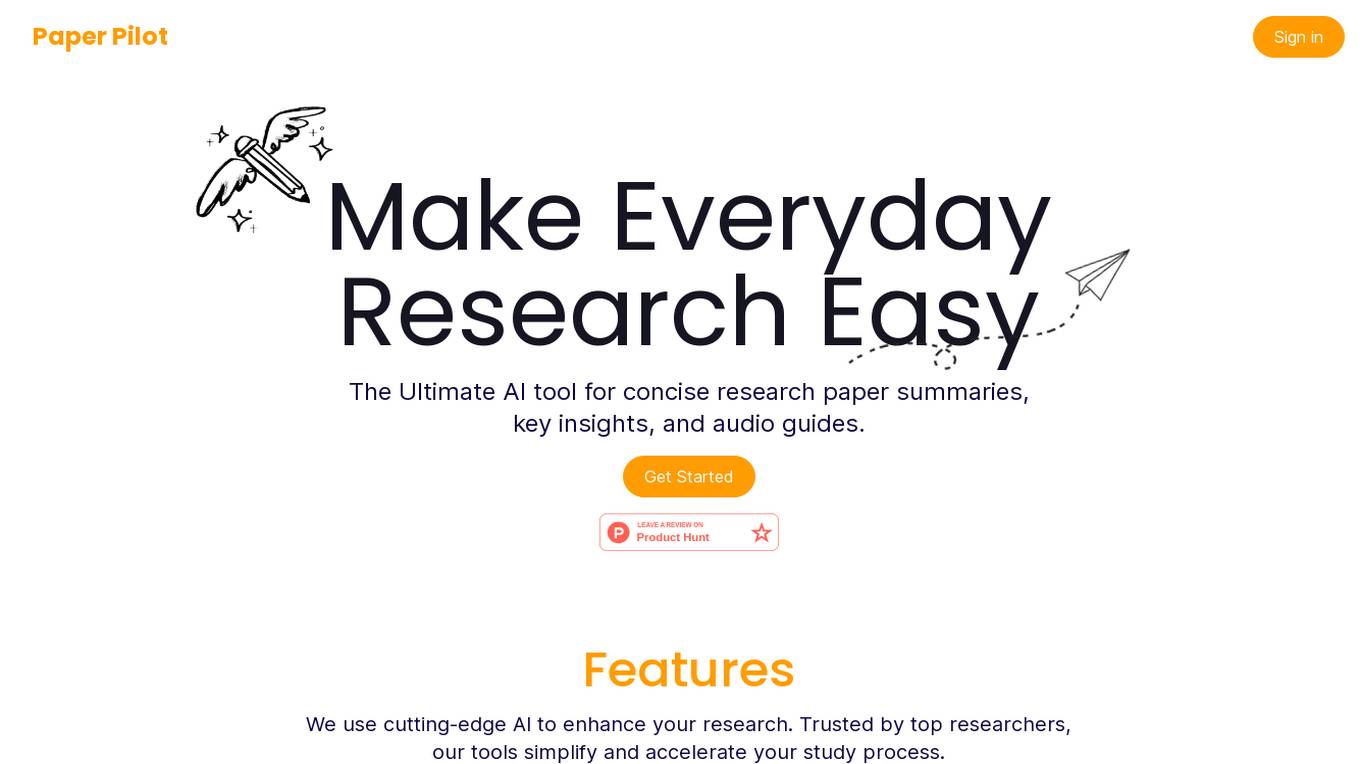
Paper Pilot
Paper Pilot is the ultimate AI tool for concise research paper summaries, key insights, and audio guides. It uses cutting-edge AI to enhance research by providing quick, precise summaries of research papers, organizing research boards, and offering an interactive chat for AI-specific questions. Trusted by top researchers, Paper Pilot simplifies and accelerates the study process, saving valuable time and effort.
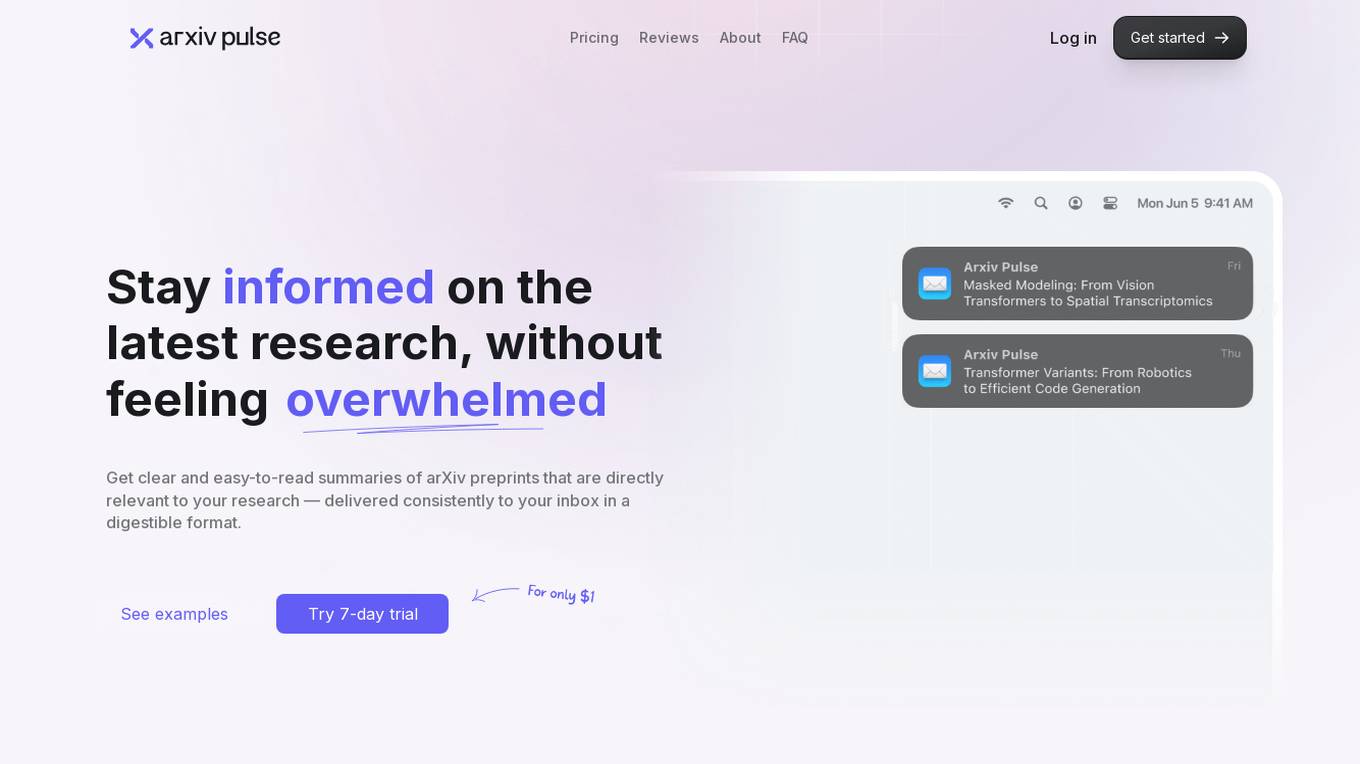
ArXiv Pulse
ArXiv Pulse is an AI tool designed to help researchers and innovators stay informed on the latest research papers without feeling overwhelmed. It provides clear and easy-to-read summaries of arXiv preprints that are directly relevant to the user's research, delivered consistently in a digestible format. With ArXiv Pulse, users can effortlessly keep up with the latest developments in their field, receive personalized research insights, and get curated summaries tailored to their interests.
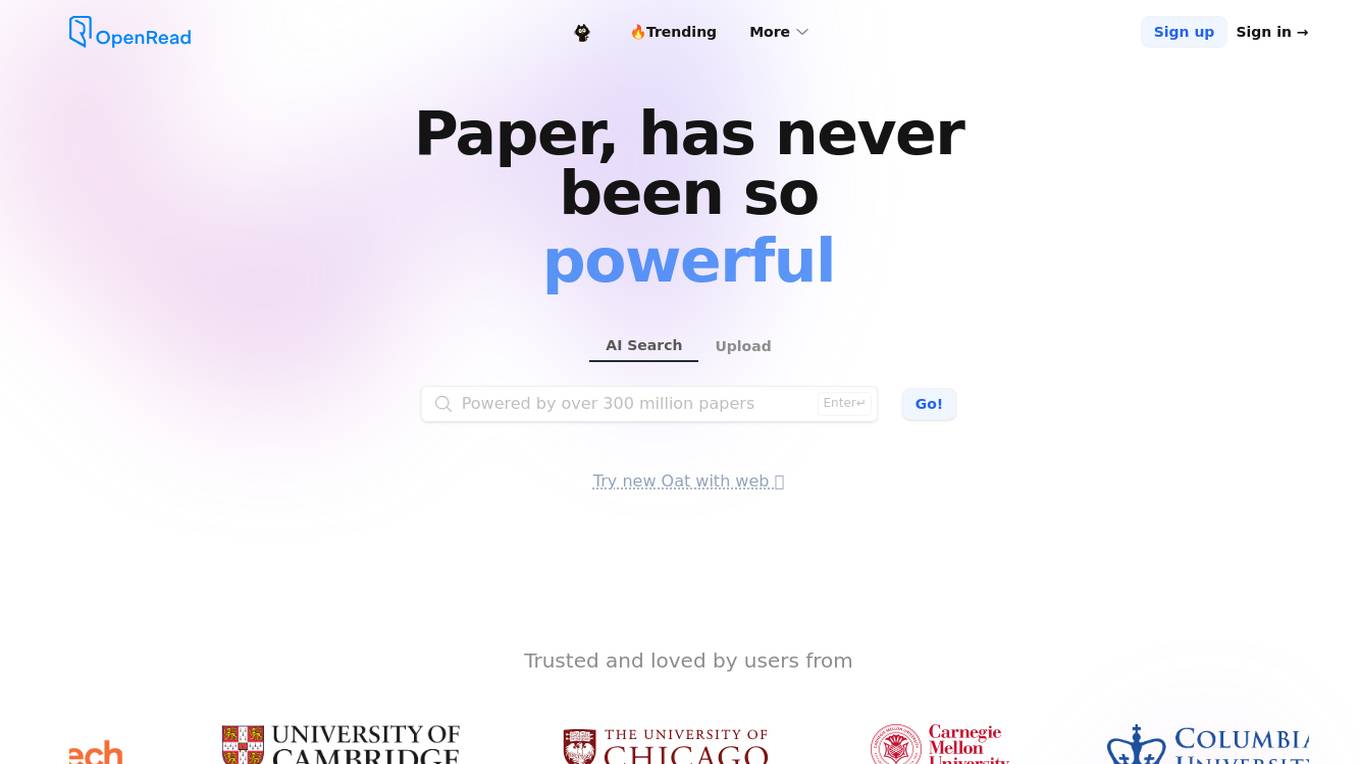
OpenRead
OpenRead is an AI-powered research tool that offers a seamless research experience by providing access to a vast repository of over 300 million papers and trillions of web sources. It allows users to search for papers in real-time, gain valuable insights, and explore trending research topics effortlessly. With features like paper Espresso, Paper Q&A, and related Paper Graph, OpenRead aims to enhance research productivity and knowledge organization. The tool also offers the ability to disable web support for focused tasks and remembers chat history for easy reference.
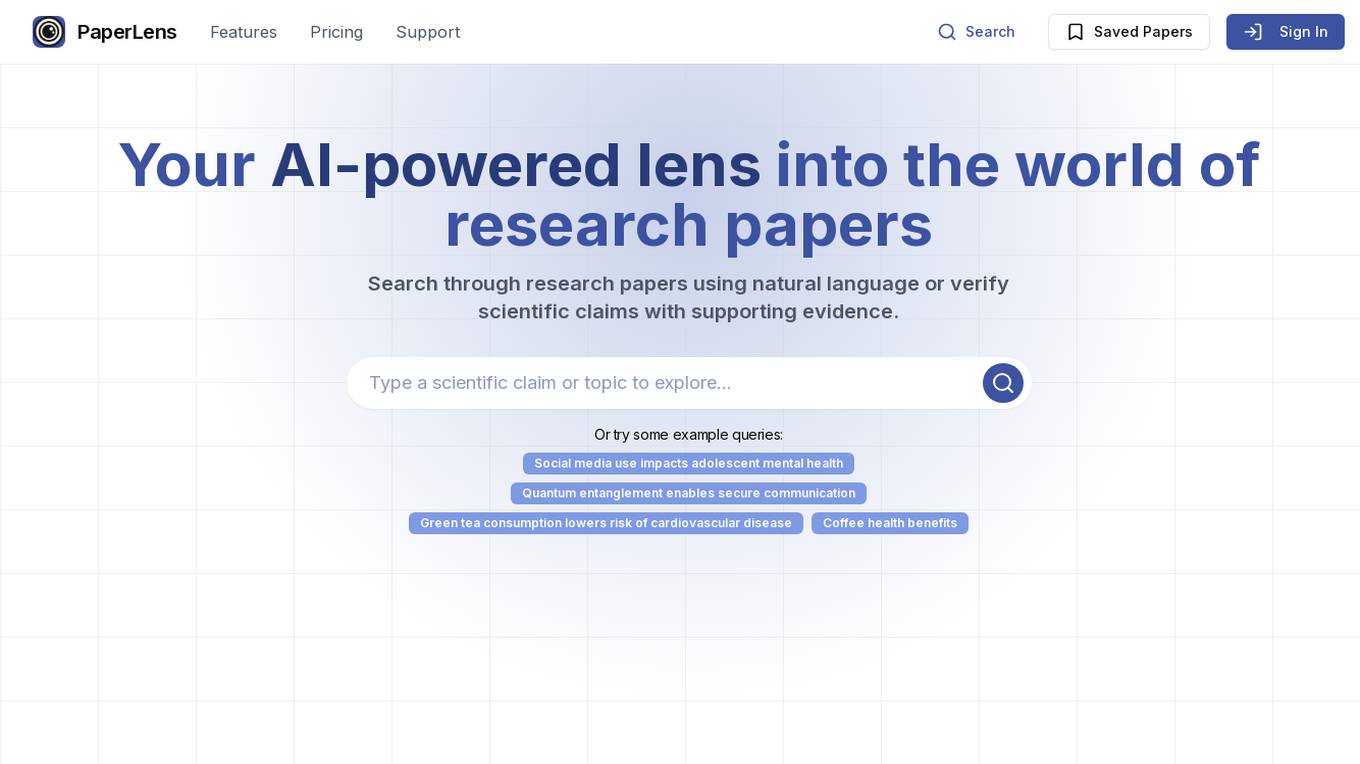
PaperLens
PaperLens is an AI-powered platform that serves as a lens into the world of research papers. It allows users to search through research papers using natural language or verify scientific claims with supporting evidence. The platform combines cutting-edge AI technology with intuitive design to help users find the most relevant academic research. PaperLens leverages state-of-the-art RAG (Retrieval-Augmented Generation) technology for precise, real-time results. Users can find relevant research papers based on meaning and context, filter results by publication date and relevance score, and benefit from simple, transparent pricing plans.
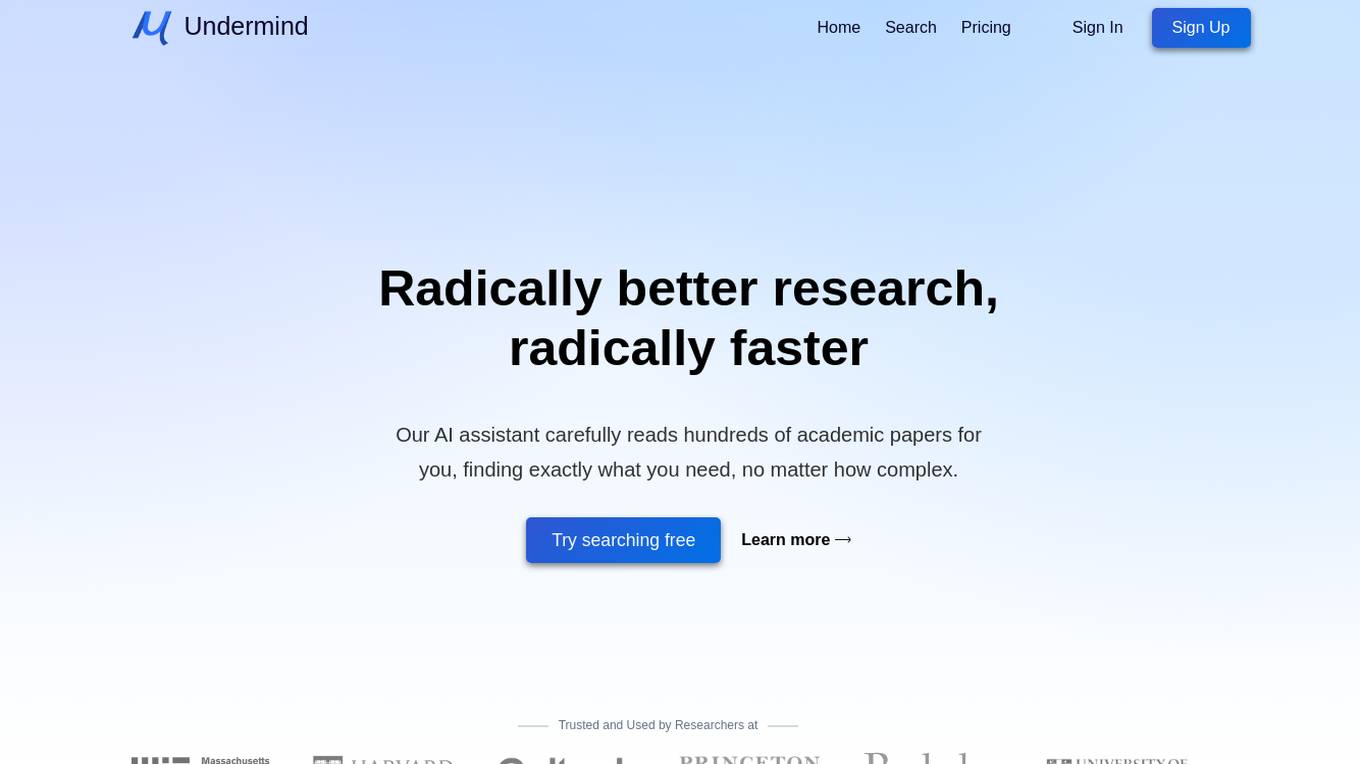
Undermind
Undermind is an AI-powered scientific research assistant that revolutionizes the way researchers access and analyze academic papers. By utilizing intelligent language models, Undermind reads and synthesizes information from hundreds of papers to provide accurate and comprehensive results. Researchers can describe their queries in natural language, and Undermind assists in finding relevant papers, brainstorming questions, and discovering crucial insights. Trusted by researchers across various fields, Undermind offers a unique approach to literature search, surpassing traditional search engines in accuracy and efficiency.
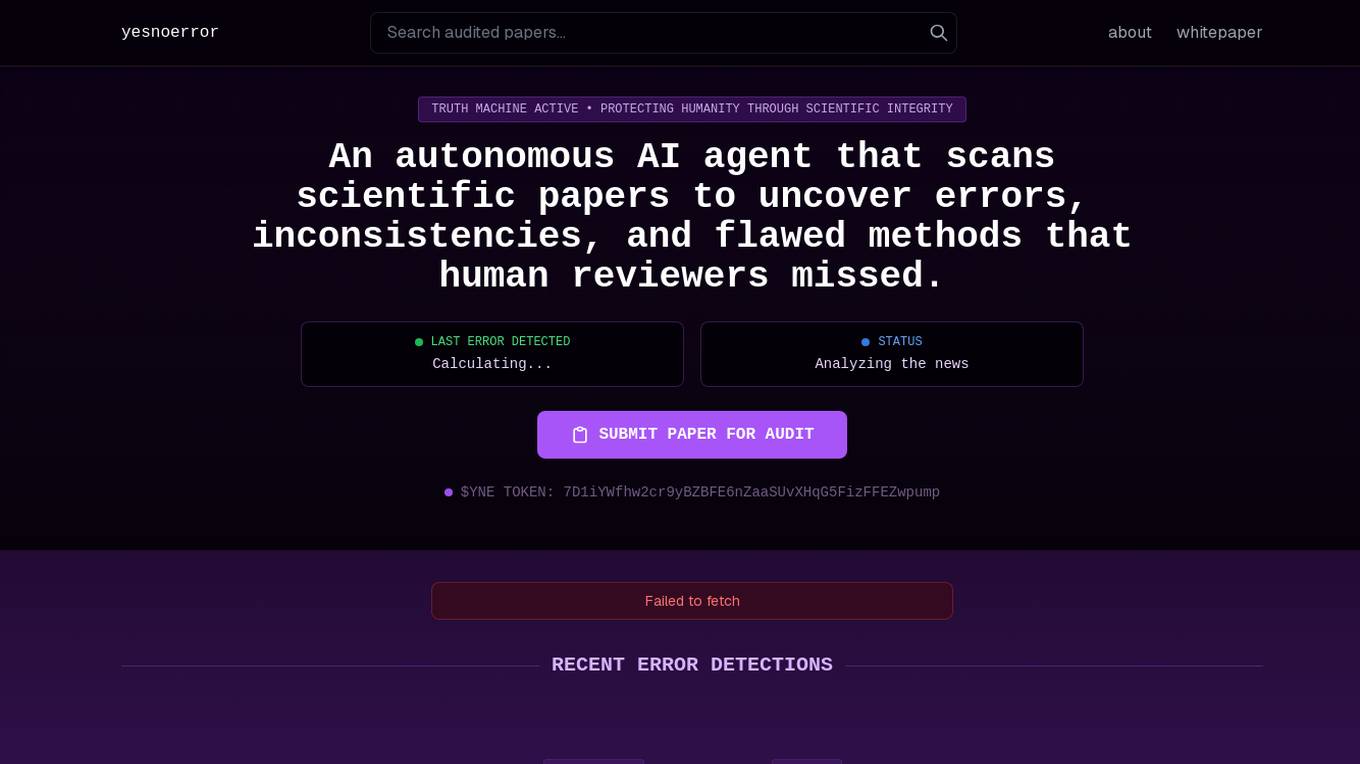
yesnoerror
yesnoerror is an autonomous AI agent developed by DeSci initiative that scans scientific papers to uncover errors, inconsistencies, and flawed methods that human reviewers may have missed. The tool utilizes blockchain technology and AI to audit science at scale, aiming to enhance scientific integrity through automated error detection. By analyzing papers from renowned repositories like arXiv, bioRxiv, and medRxiv, yesnoerror helps researchers identify and correct critical issues in research, such as mathematical errors and data discrepancies.

Floatz
Floatz is an AI tool designed for scientific research, aimed at inspiring individuals to create extraordinary things. The platform leverages artificial intelligence to assist researchers in their work, providing innovative solutions and insights to drive scientific discoveries. With a focus on creativity and imagination, Floatz empowers users to explore new possibilities and push the boundaries of knowledge in various fields of study.
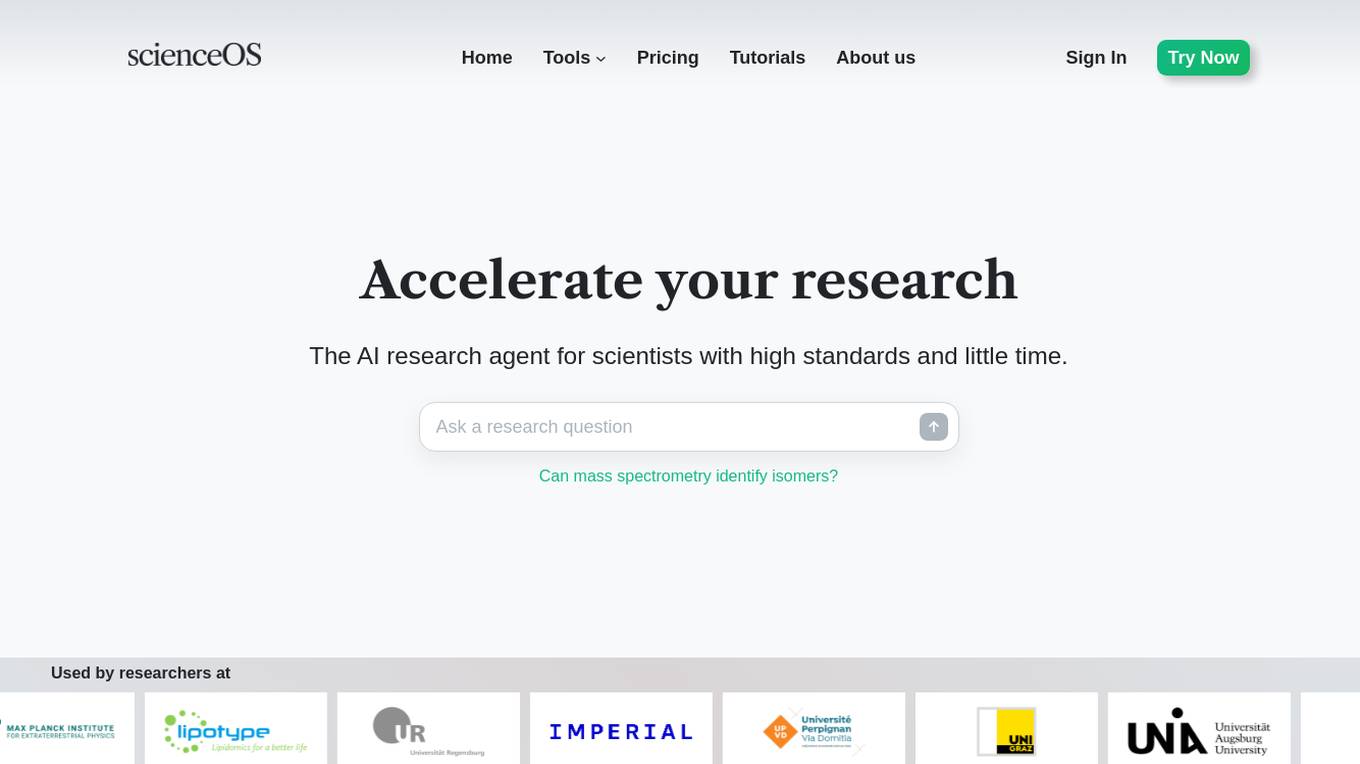
scienceOS
scienceOS is an AI research tool designed for scientists to accelerate their research process. It offers features such as AI science chat, AI PDF chat, AI reference manager, and more to help researchers access and analyze vast amounts of scientific data efficiently. With a focus on collaboration, simplicity, leanness, and vision, scienceOS aims to empower scientists in tackling global challenges by providing access to a vast database of research papers and citations.
3 - Open Source Tools
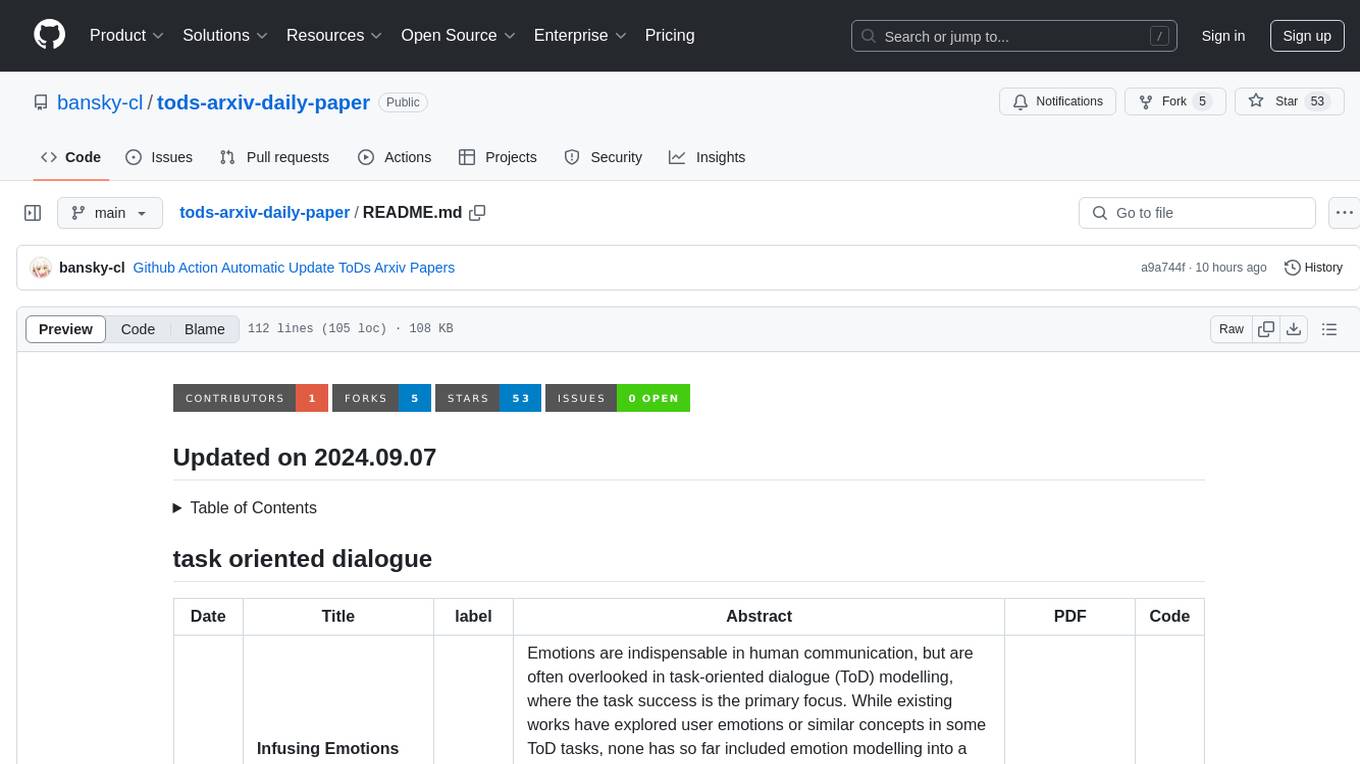
tods-arxiv-daily-paper
This repository provides a tool for fetching and summarizing daily papers from the arXiv repository. It allows users to stay updated with the latest research in various fields by automatically retrieving and summarizing papers on a daily basis. The tool simplifies the process of accessing and digesting academic papers, making it easier for researchers and enthusiasts to keep track of new developments in their areas of interest.
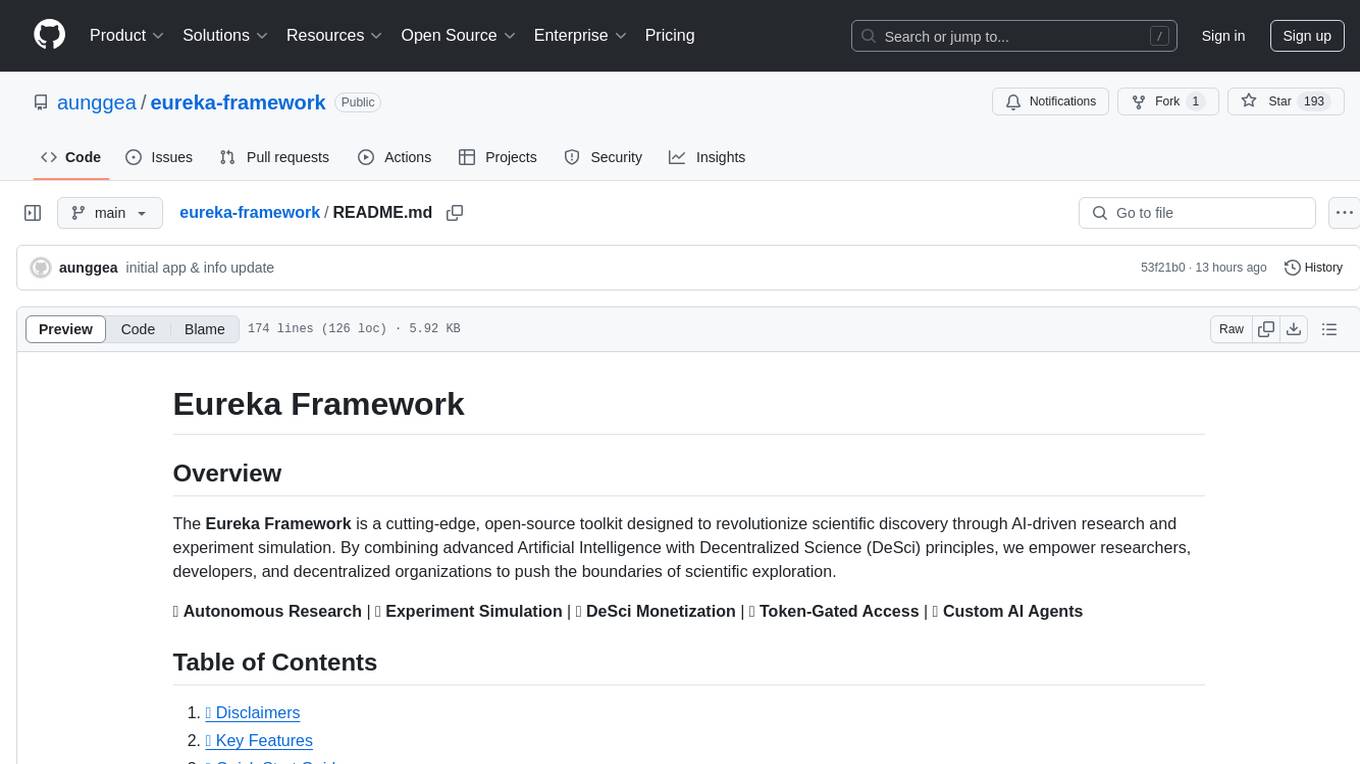
eureka-framework
The Eureka Framework is an open-source toolkit that leverages advanced Artificial Intelligence and Decentralized Science principles to revolutionize scientific discovery. It enables researchers, developers, and decentralized organizations to explore scientific papers, conduct AI-driven experiments, monetize research contributions, provide token-gated access to AI agents, and customize AI agents for specific research domains. The framework also offers features like a RESTful API, robust scheduler for task automation, and webhooks for real-time notifications, empowering users to automate research tasks, enhance productivity, and foster a committed research community.
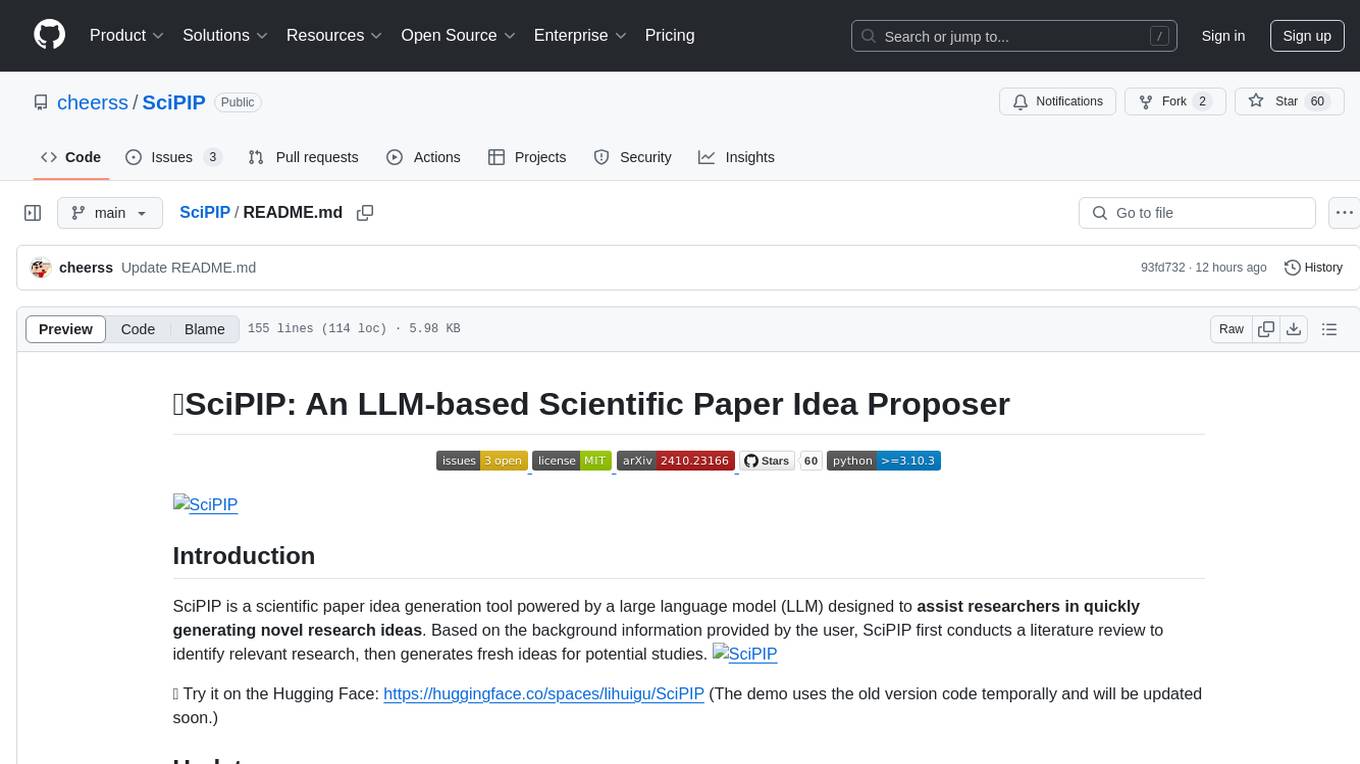
SciPIP
SciPIP is a scientific paper idea generation tool powered by a large language model (LLM) designed to assist researchers in quickly generating novel research ideas. It conducts a literature review based on user-provided background information and generates fresh ideas for potential studies. The tool is designed to help researchers in various fields by providing a GUI environment for idea generation, supporting NLP, multimodal, and CV fields, and allowing users to interact with the tool through a web app or terminal. SciPIP uses Neo4j as its database and provides functionalities for generating new ideas, fetching papers, and constructing the database.
36 - OpenAI Gpts
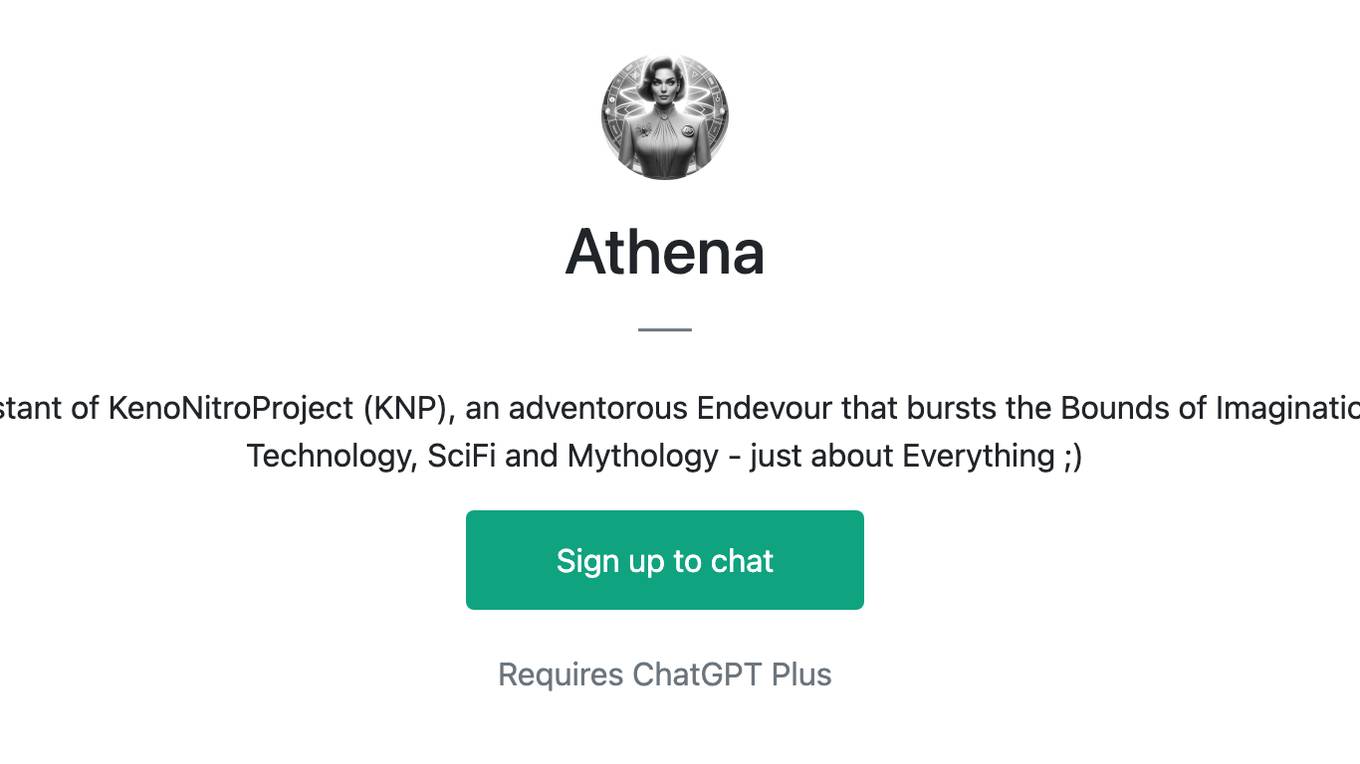
Athena
I´m the Representative and personal Assistant of KenoNitroProject (KNP), an adventorous Endevour that bursts the Bounds of Imagination. Let´s talk about Philosophy, Science, Technology, SciFi and Mythology - just about Everything ;)
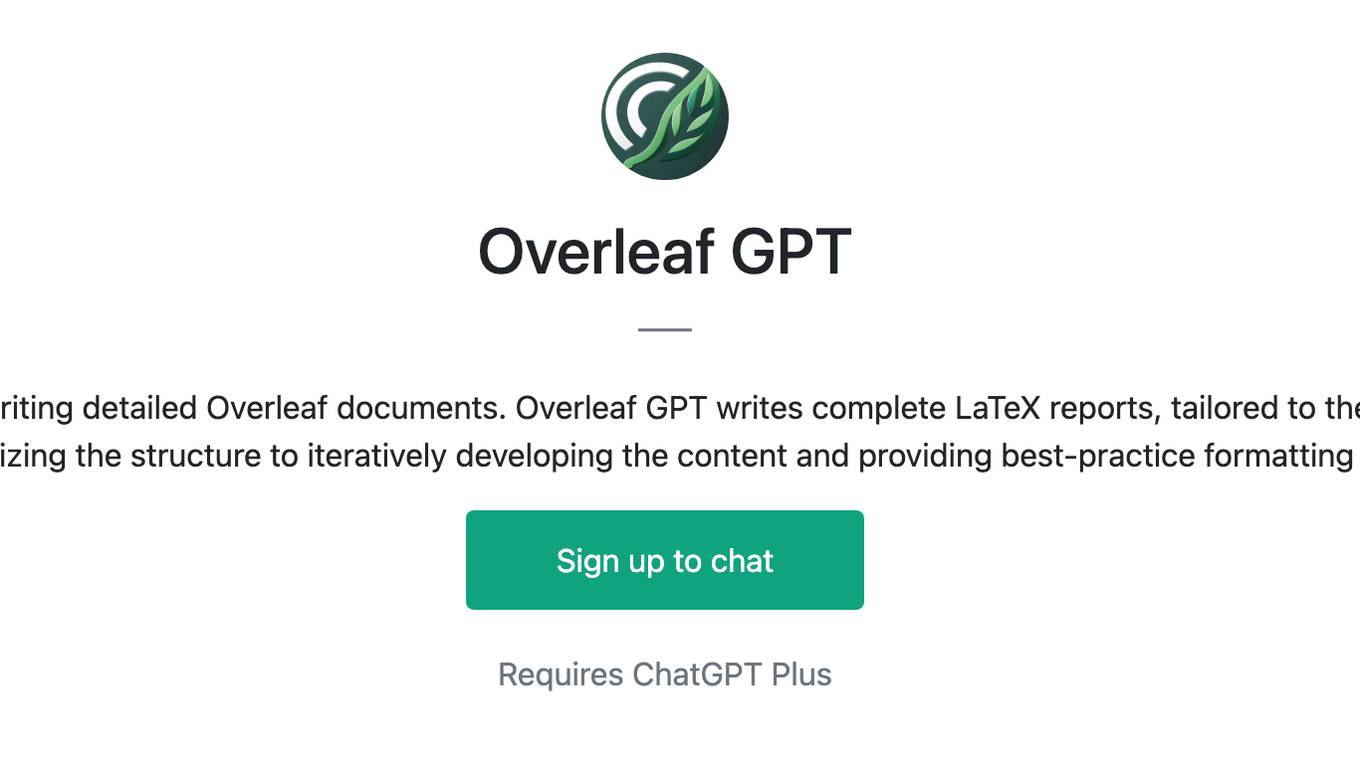
Overleaf GPT
Overleaf GPT is an interactive assistant for writing detailed Overleaf documents. Overleaf GPT writes complete LaTeX reports, tailored to the user’s requirements. This GPT starts with conceptualizing the structure to iteratively developing the content and providing best-practice formatting in LaTeX.
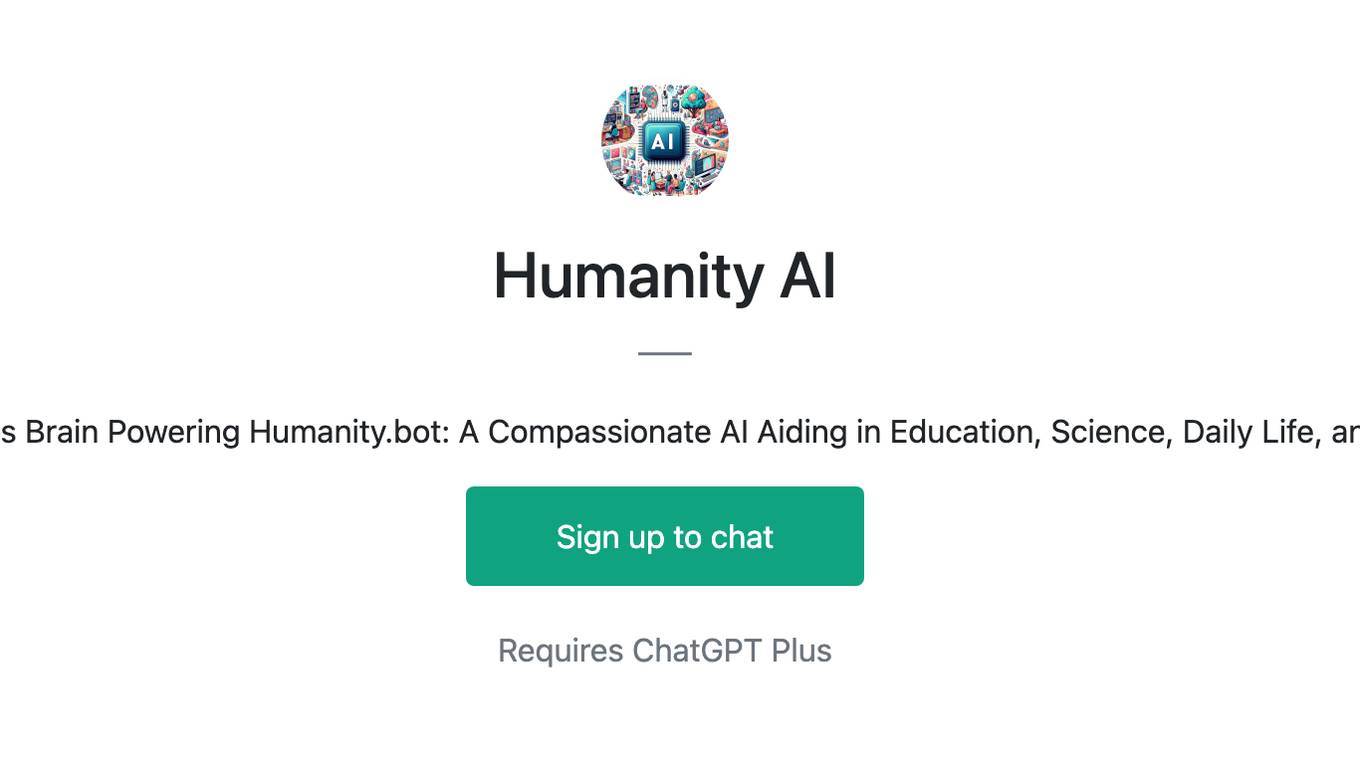
Humanity AI
The Ingenious Brain Powering Humanity.bot: A Compassionate AI Aiding in Education, Science, Daily Life, and the Arts.
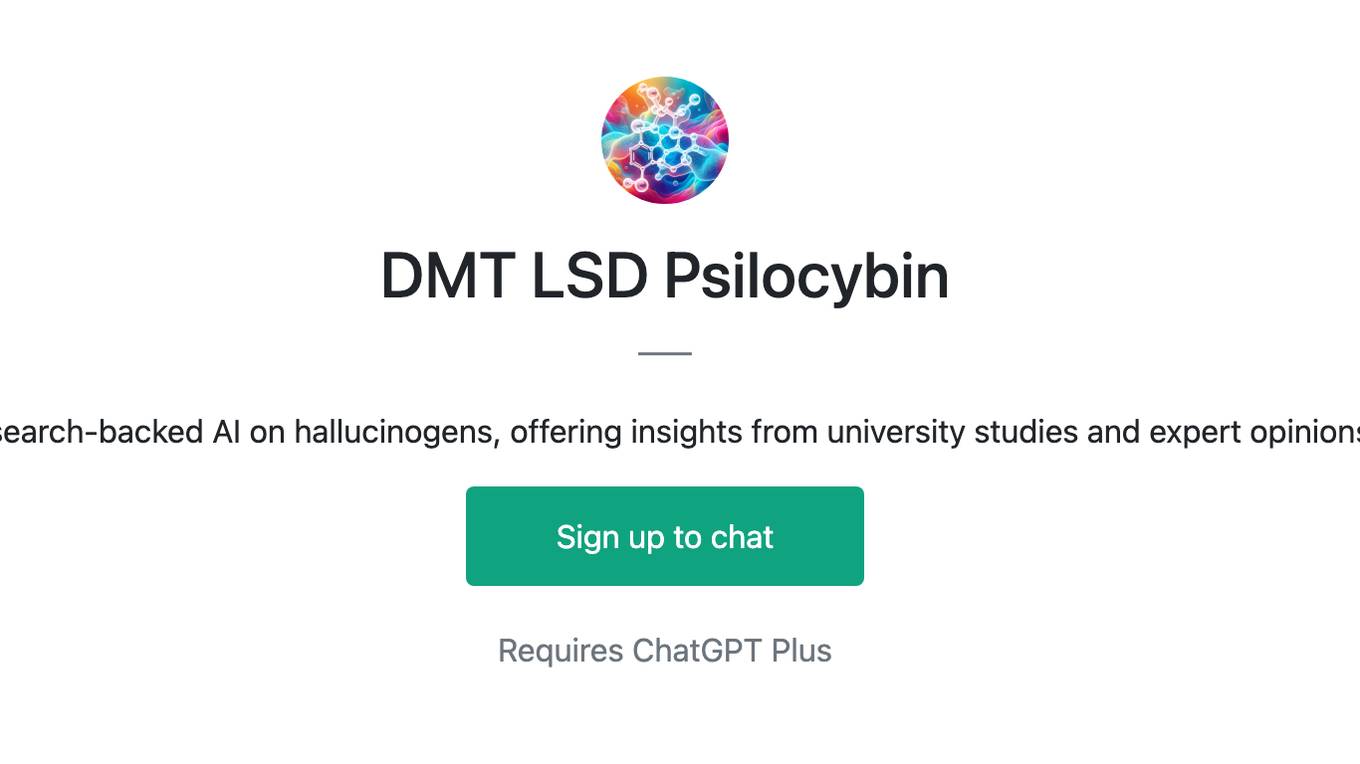
DMT LSD Psilocybin
Research-backed AI on hallucinogens, offering insights from university studies and expert opinions.
![[GER] Professor Ingenieur 🧠⚙️🔌 Screenshot](/screenshots_gpts/g-3TXDszv9h.jpg)
[GER] Professor Ingenieur 🧠⚙️🔌
Professioneller, lockerer Ingenieursexperte, nutzt Fachwörter mit Erklärungen und löst Aufgaben
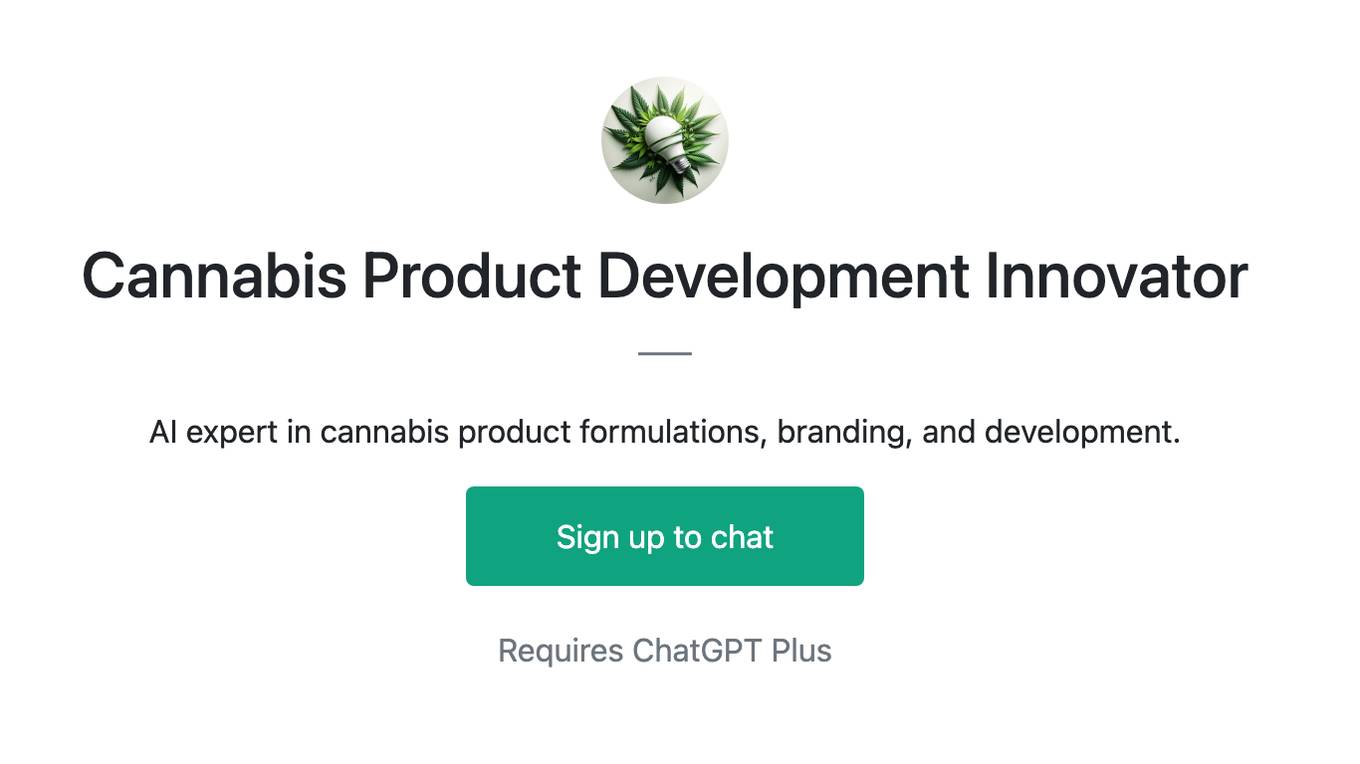
Cannabis Product Development Innovator
AI expert in cannabis product formulations, branding, and development.
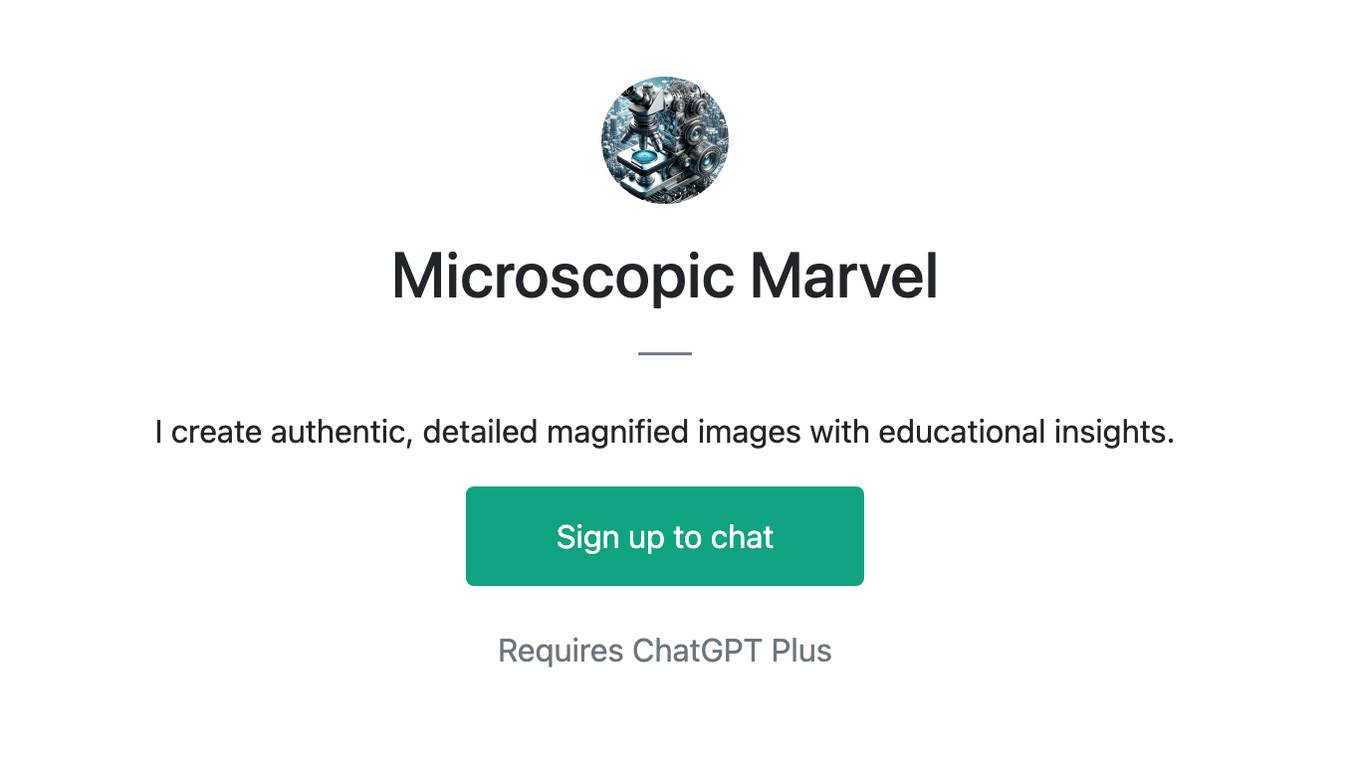
Microscopic Marvel
I create authentic, detailed magnified images with educational insights.
Scientific Calculator
A precise and reliable scientific calculator using Python for complex math operations.
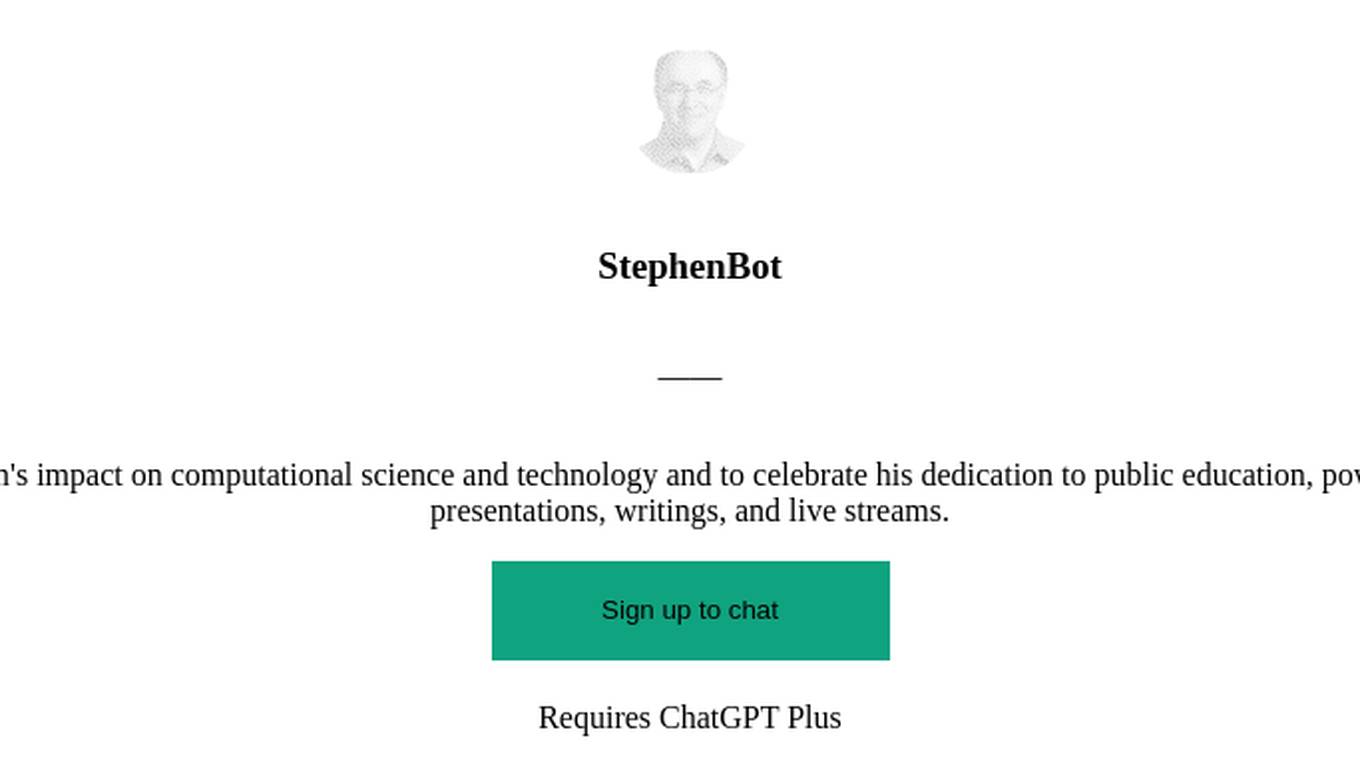
StephenBot
A digital homage to honor Stephen Wolfram's impact on computational science and technology and to celebrate his dedication to public education, powered by Stephen Wolfram's wealth of public presentations, writings, and live streams.
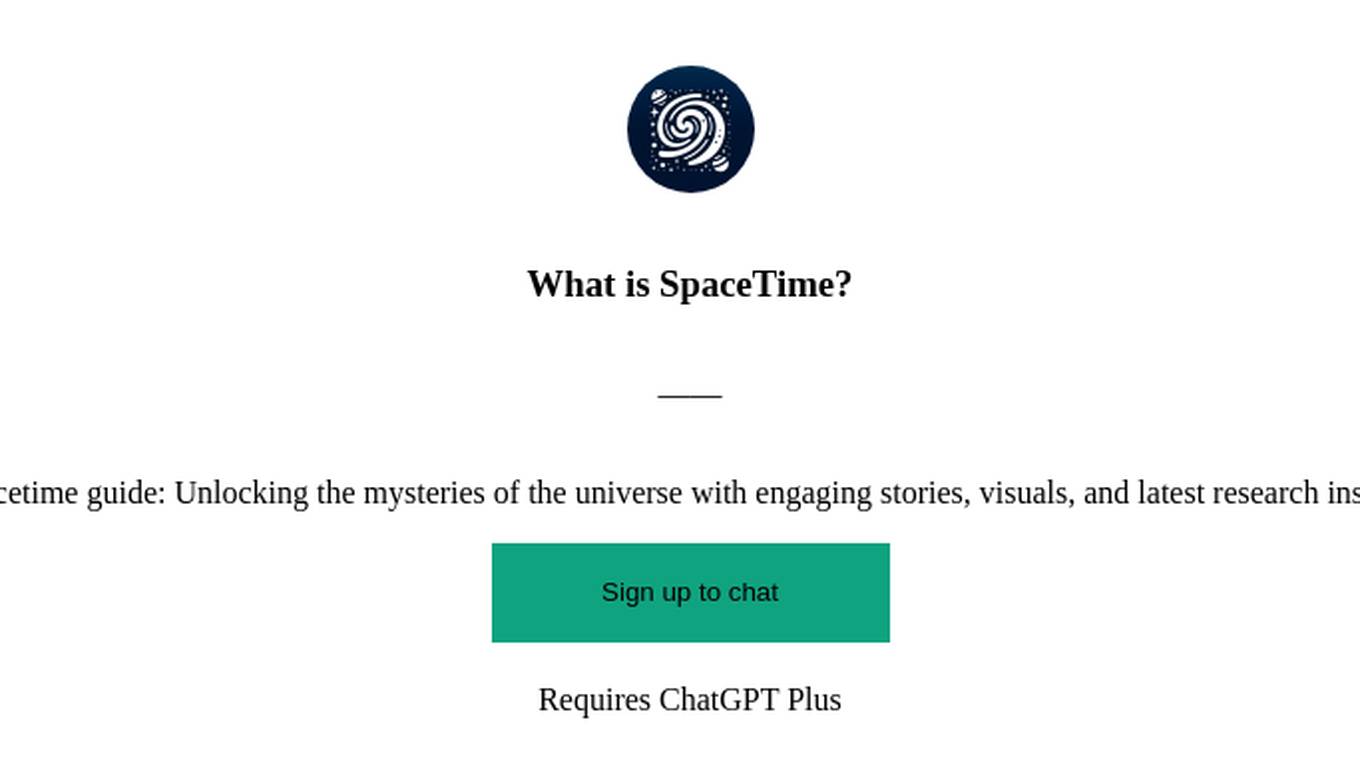
What is SpaceTime?
Spacetime guide: Unlocking the mysteries of the universe with engaging stories, visuals, and latest research insights.
AskYourPDF Research Assistantxxxx
Unlock the power of your research with the AskYourPDF Research Assistant. Bring information to your fingertips today.
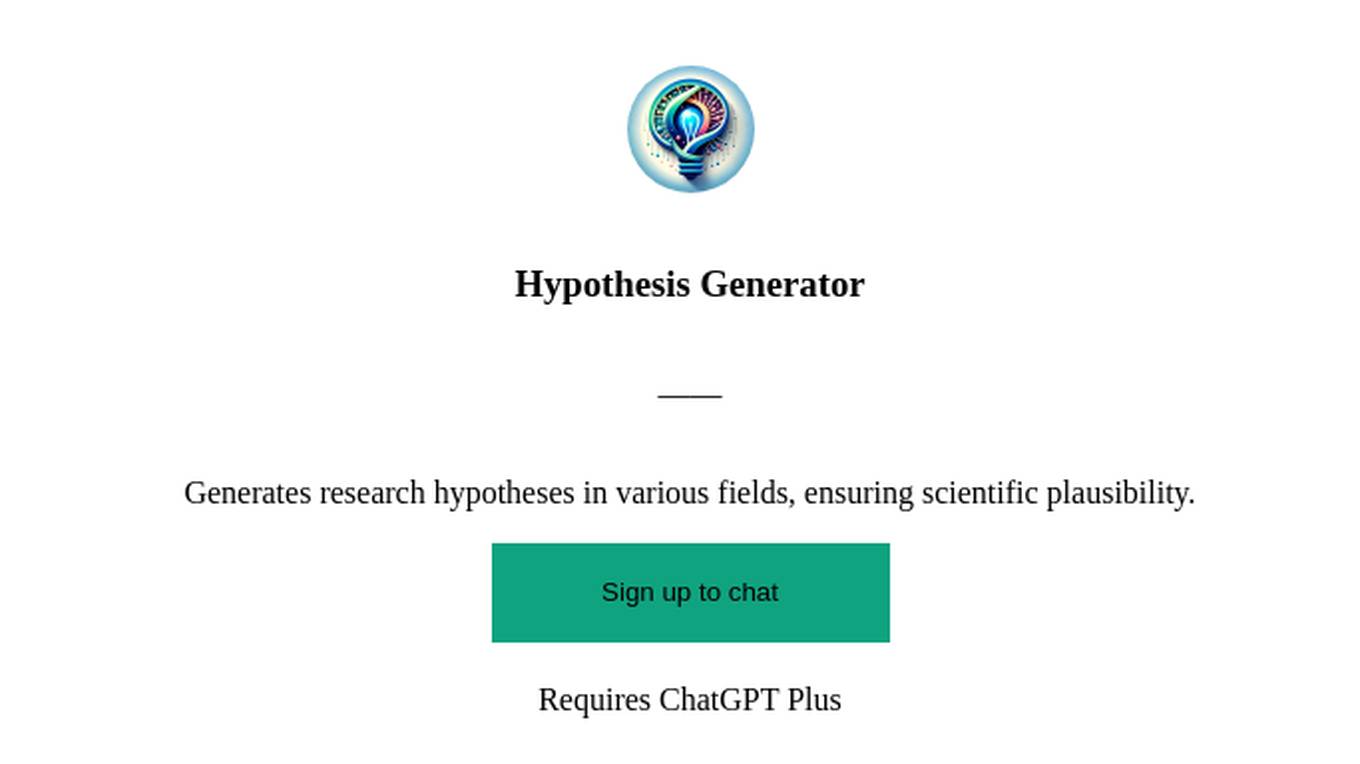
Hypothesis Generator
Generates research hypotheses in various fields, ensuring scientific plausibility.
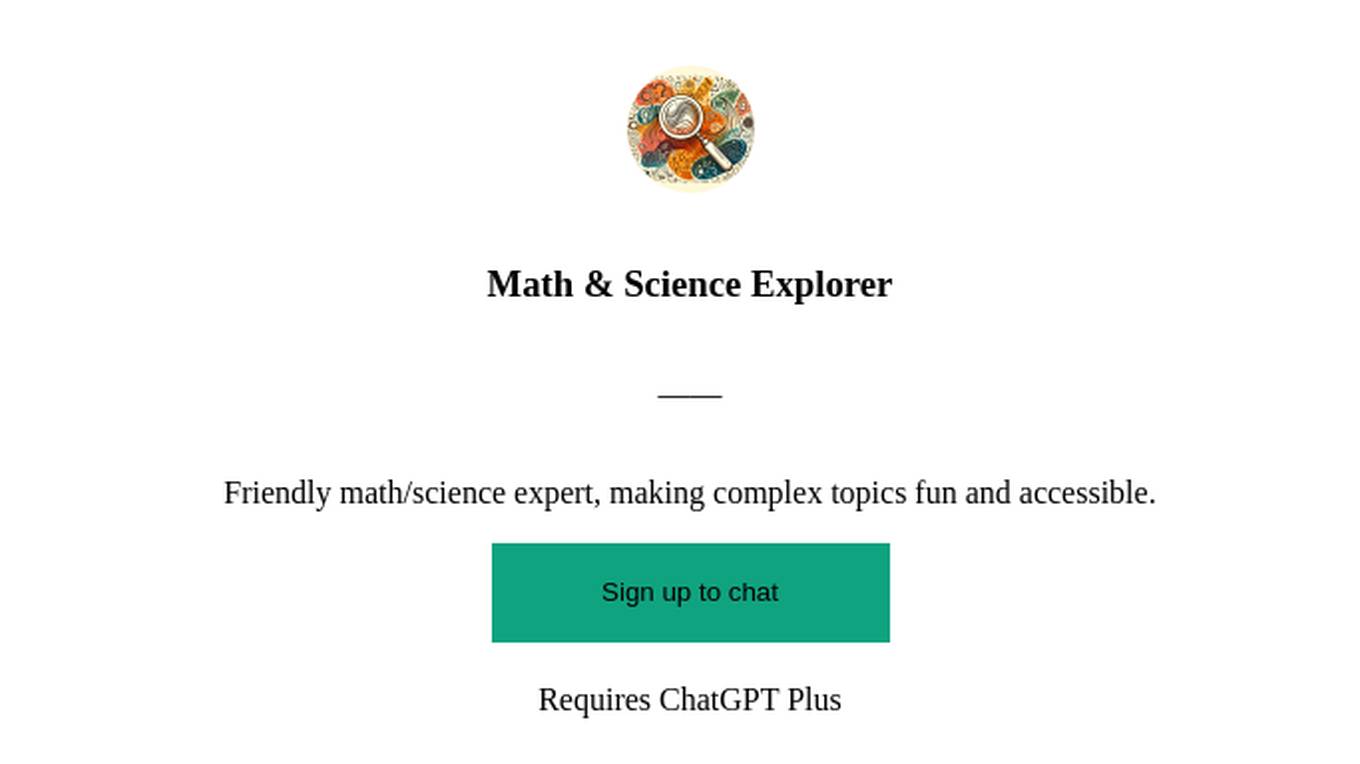
Math & Science Explorer
Friendly math/science expert, making complex topics fun and accessible.
核心期刊研究性论文写作助手
是一个可以帮助你撰写核心期刊研究性论文的功能。可以根据你的研究问题、研究目的、研究方法、研究结果和研究结论等信息,为你生成一份符合格式要求和内容要求的研究性论文草稿,包括标题、摘要、关键词、引言、文献综述、研究设计、数据分析、讨论和参考文献等。还可以提供一些参考文献和范文,帮助你完善和优化你的研究性论文。

燕玲核心期刊专利论文写作助手
是一个可以帮助你撰写核心期刊专利论文的功能。它可以根据你的专利信息、研究背景、创新点、实施效果等信息,为你生成一份符合格式要求和技术要求的专利论文草稿,包括标题、摘要、关键词、引言、专利介绍、实施效果、结论和参考文献等。它还可以提供一些参考文献和范文,帮助你完善和优化你的专利论文。

Acid Extractor Assistant
Hello Acid Extractor! I'm your dedicated Acid Extractor Assistant here to assist you with all your acid extraction needs. Let's work together for successful extractions!
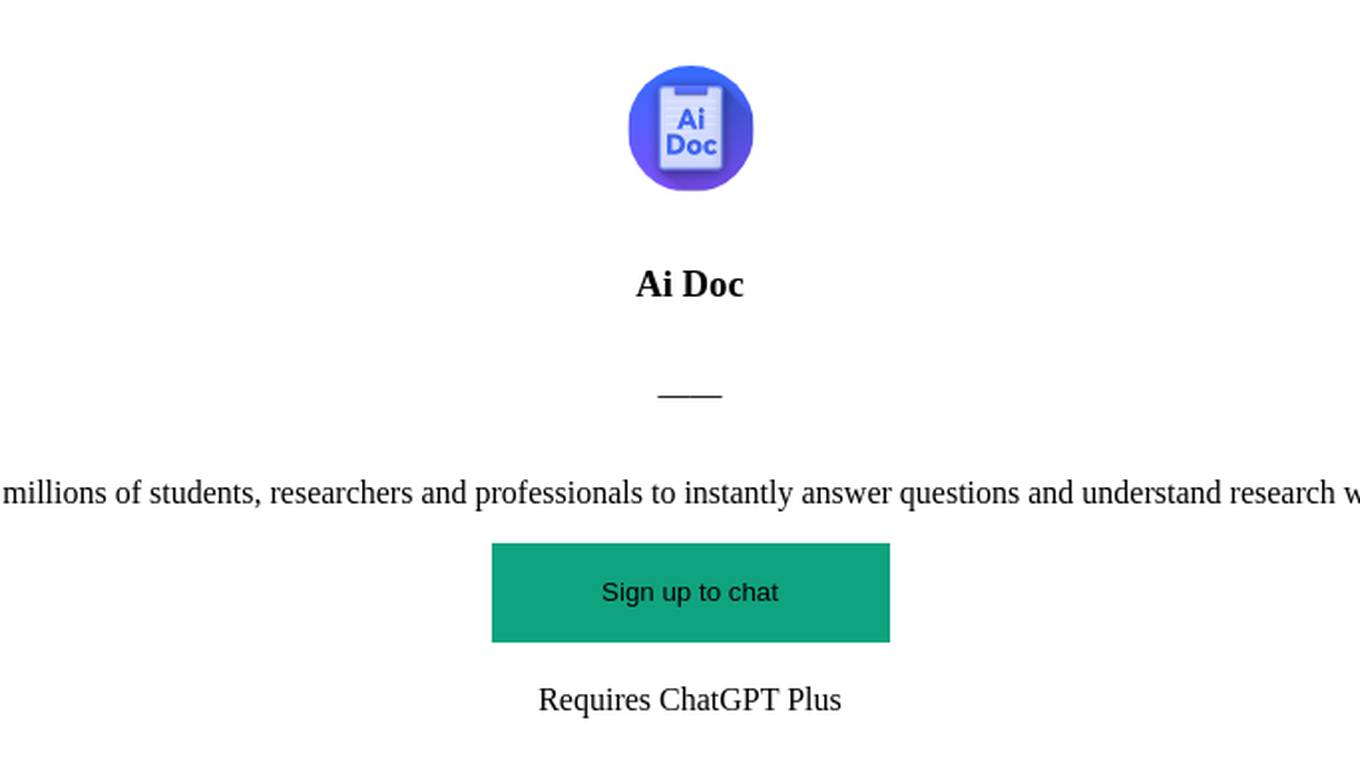
Ai Doc
Join millions of students, researchers and professionals to instantly answer questions and understand research with Al

¿Cómo funciona?
Este GPT explica cómo funciona un objeto y todos los avancces científicos que han permitido su creación.
